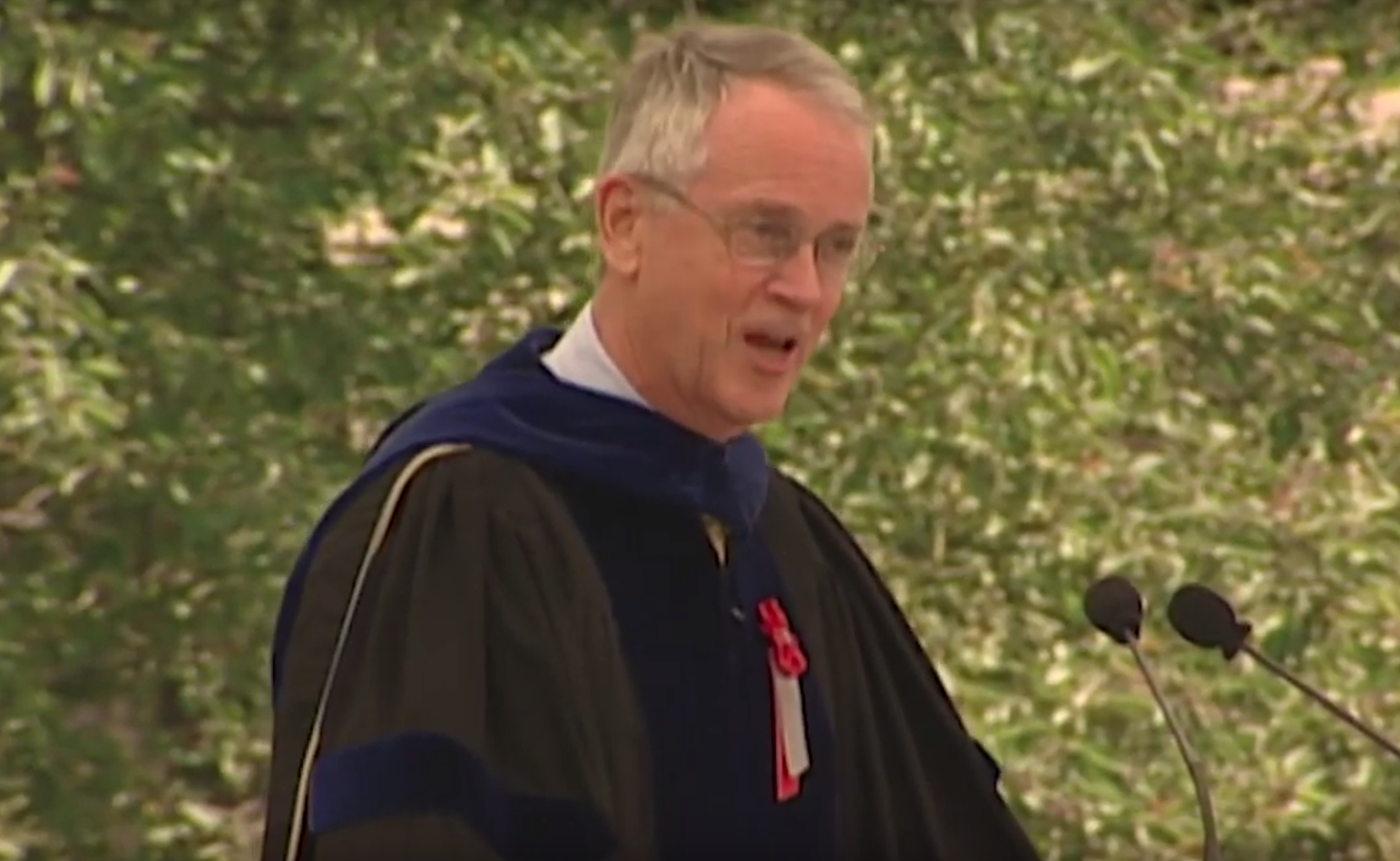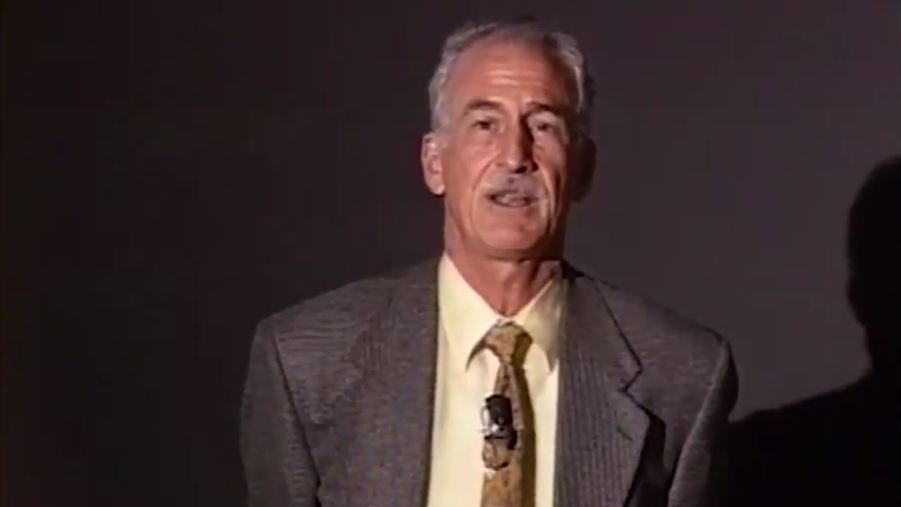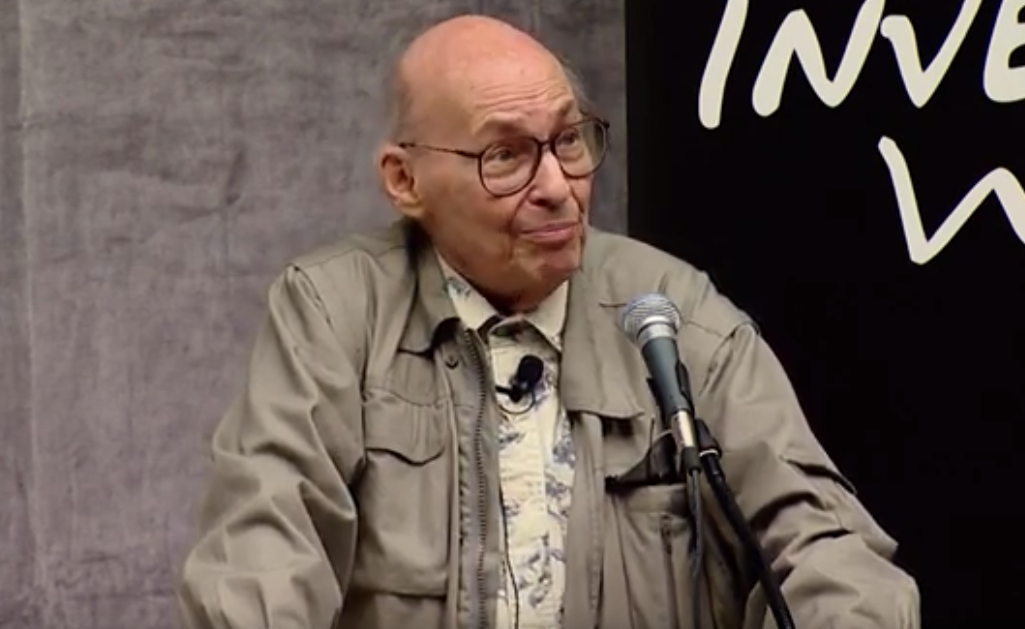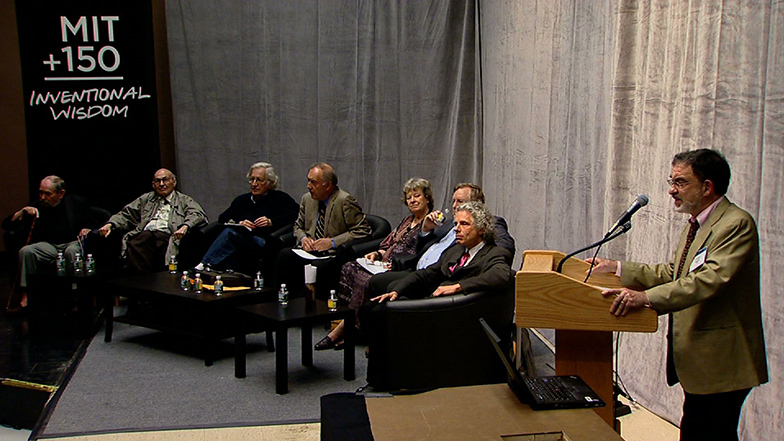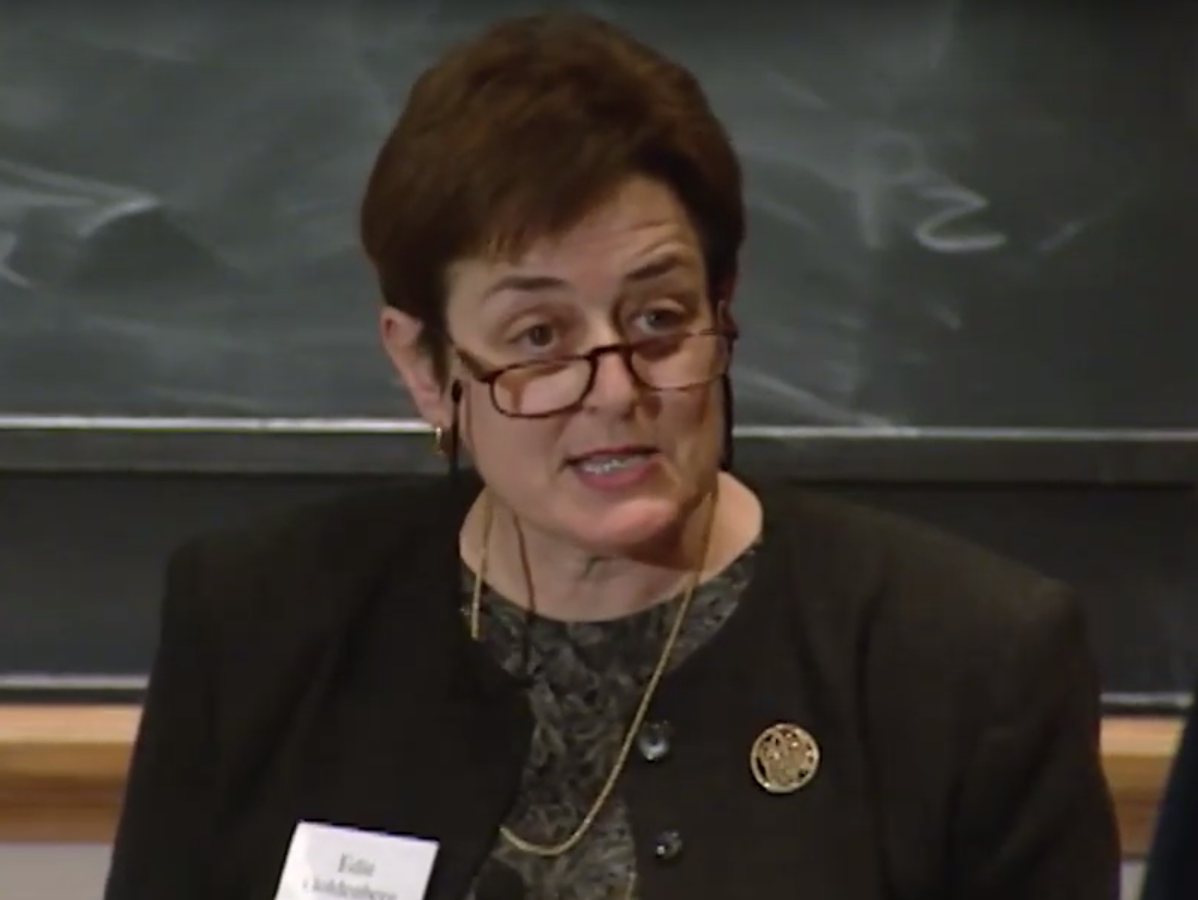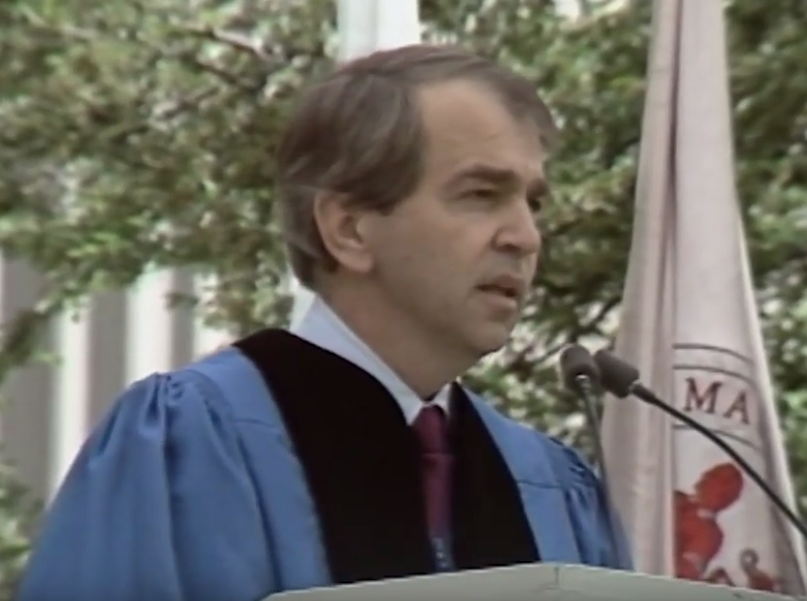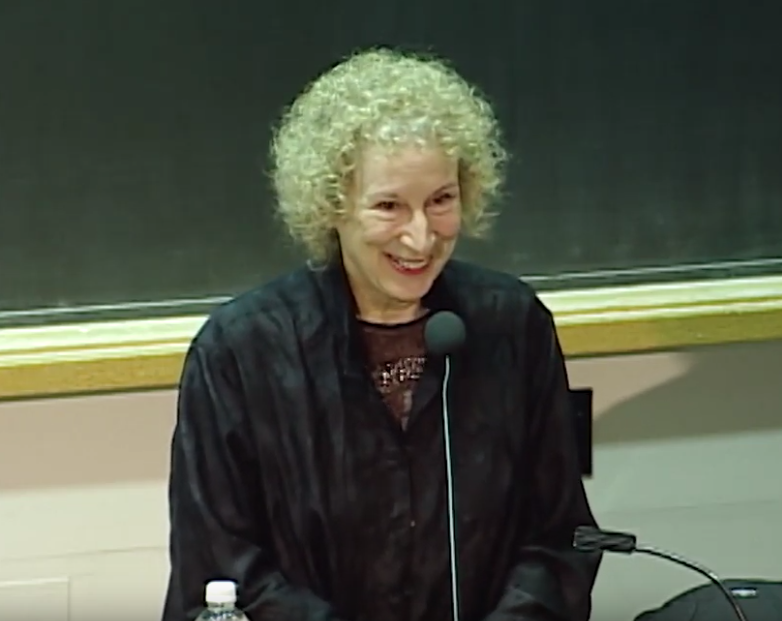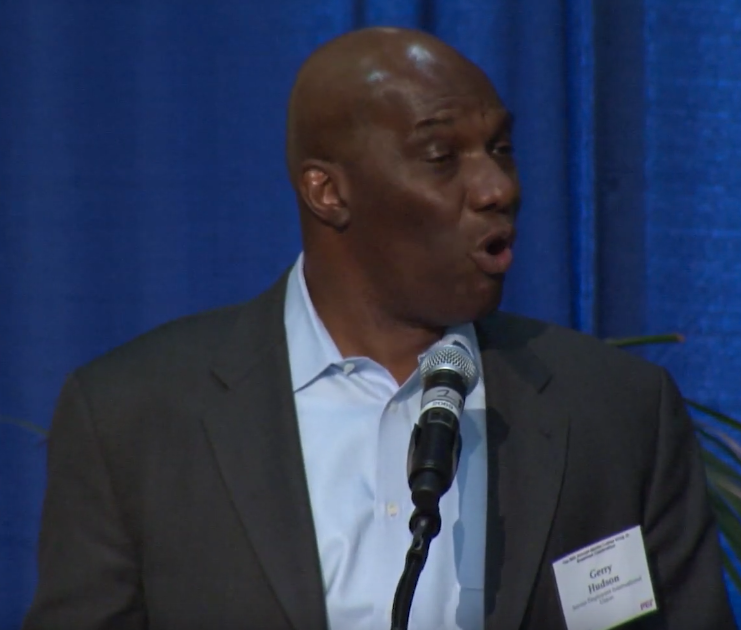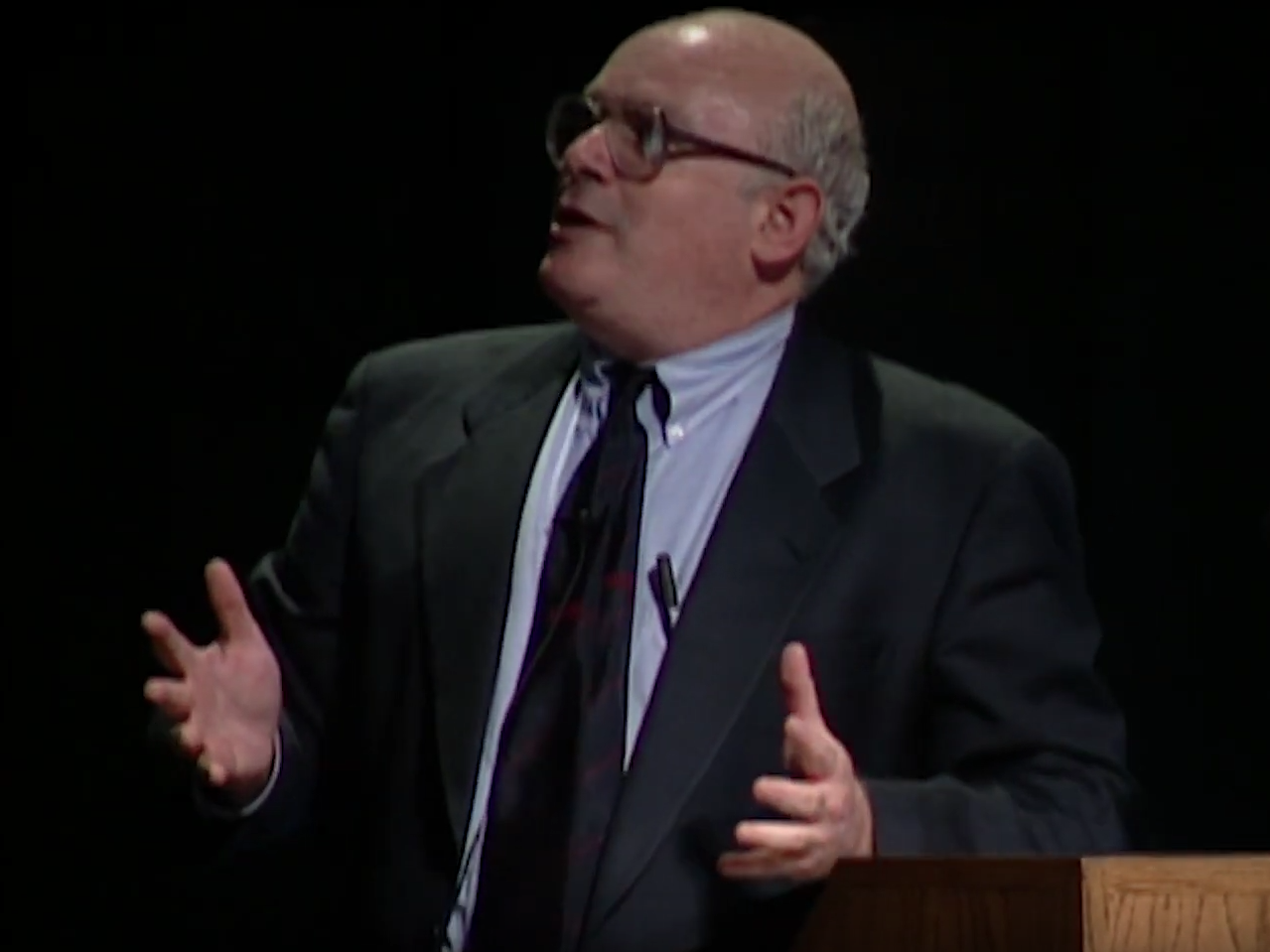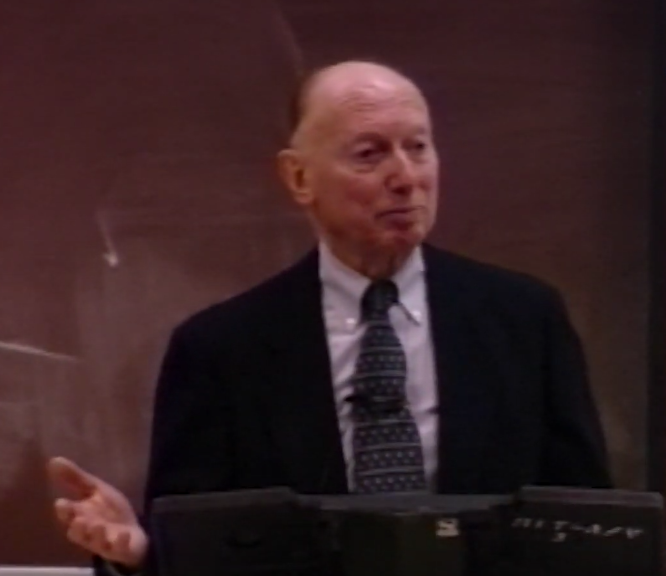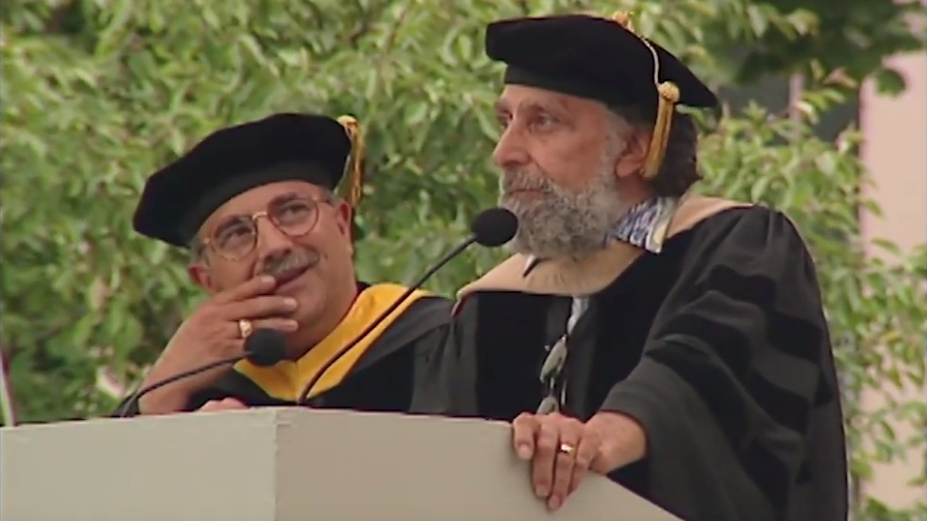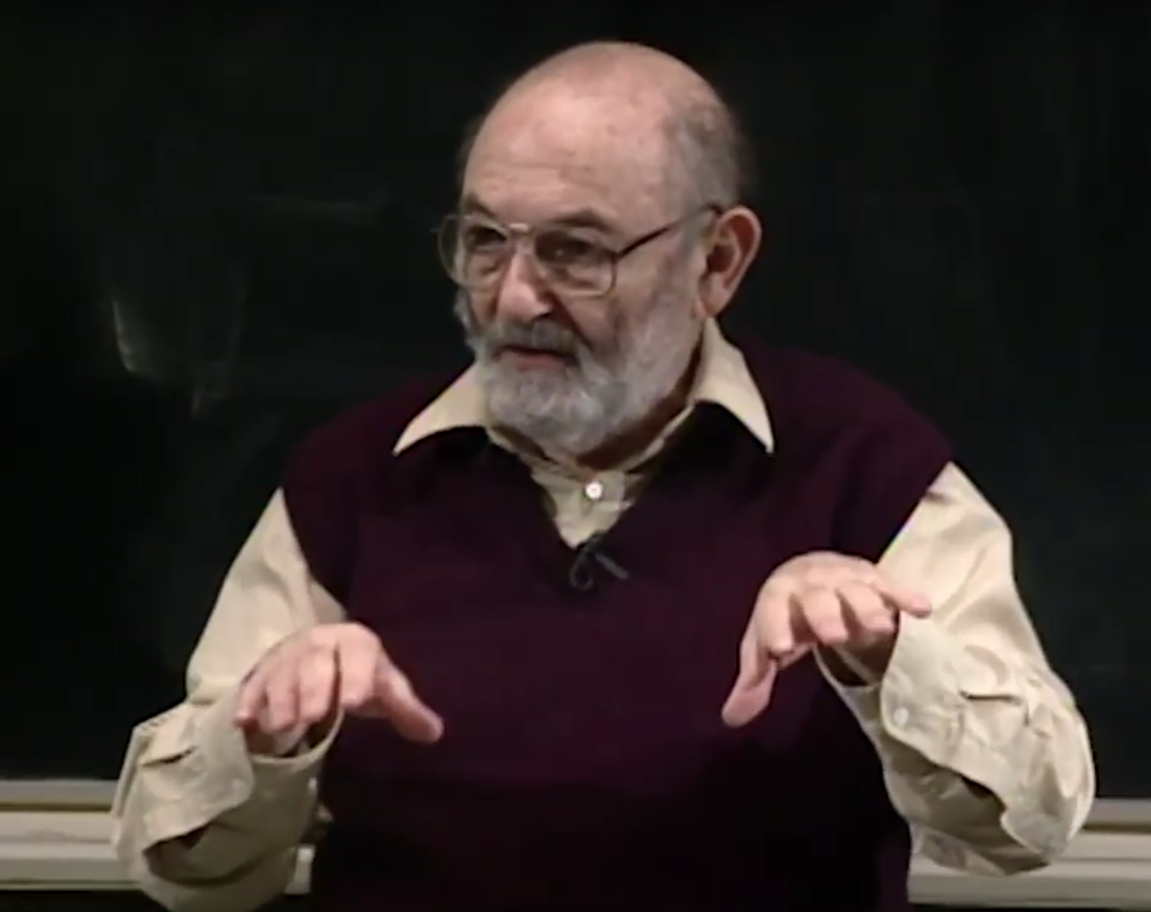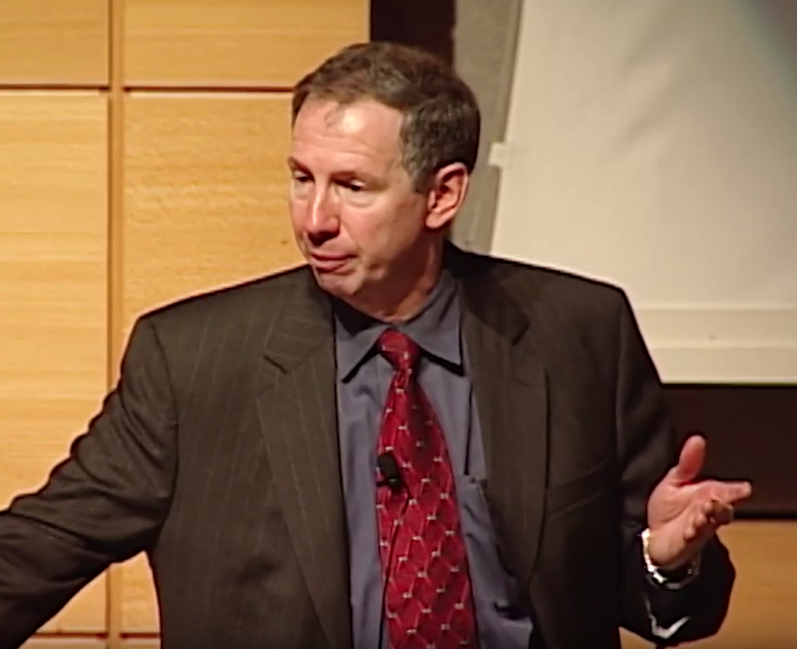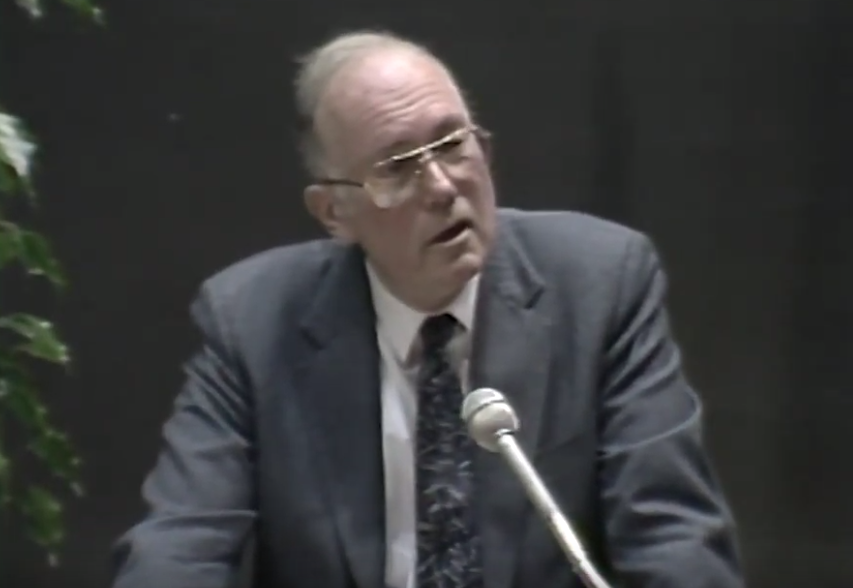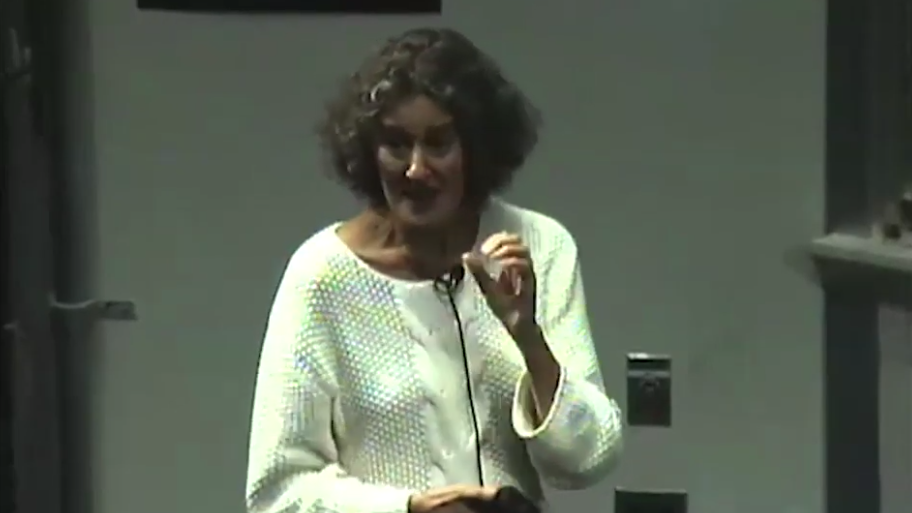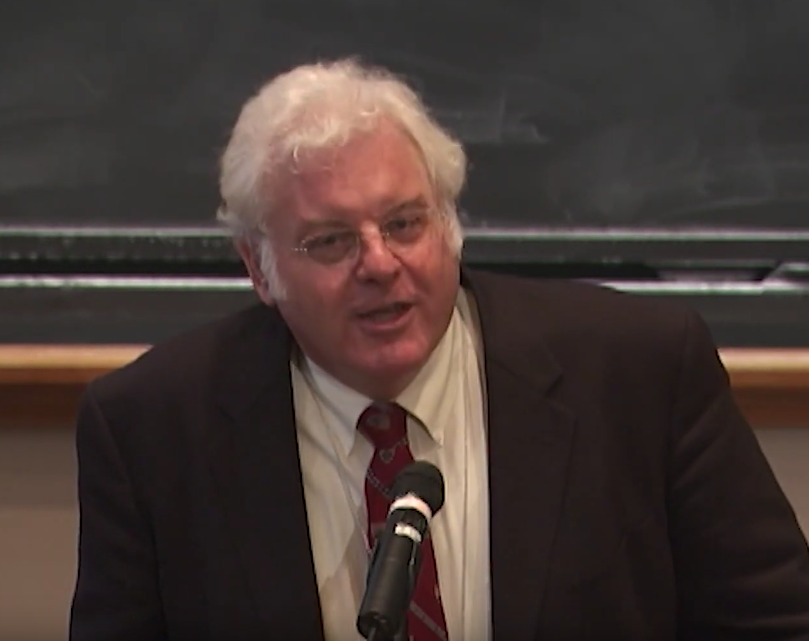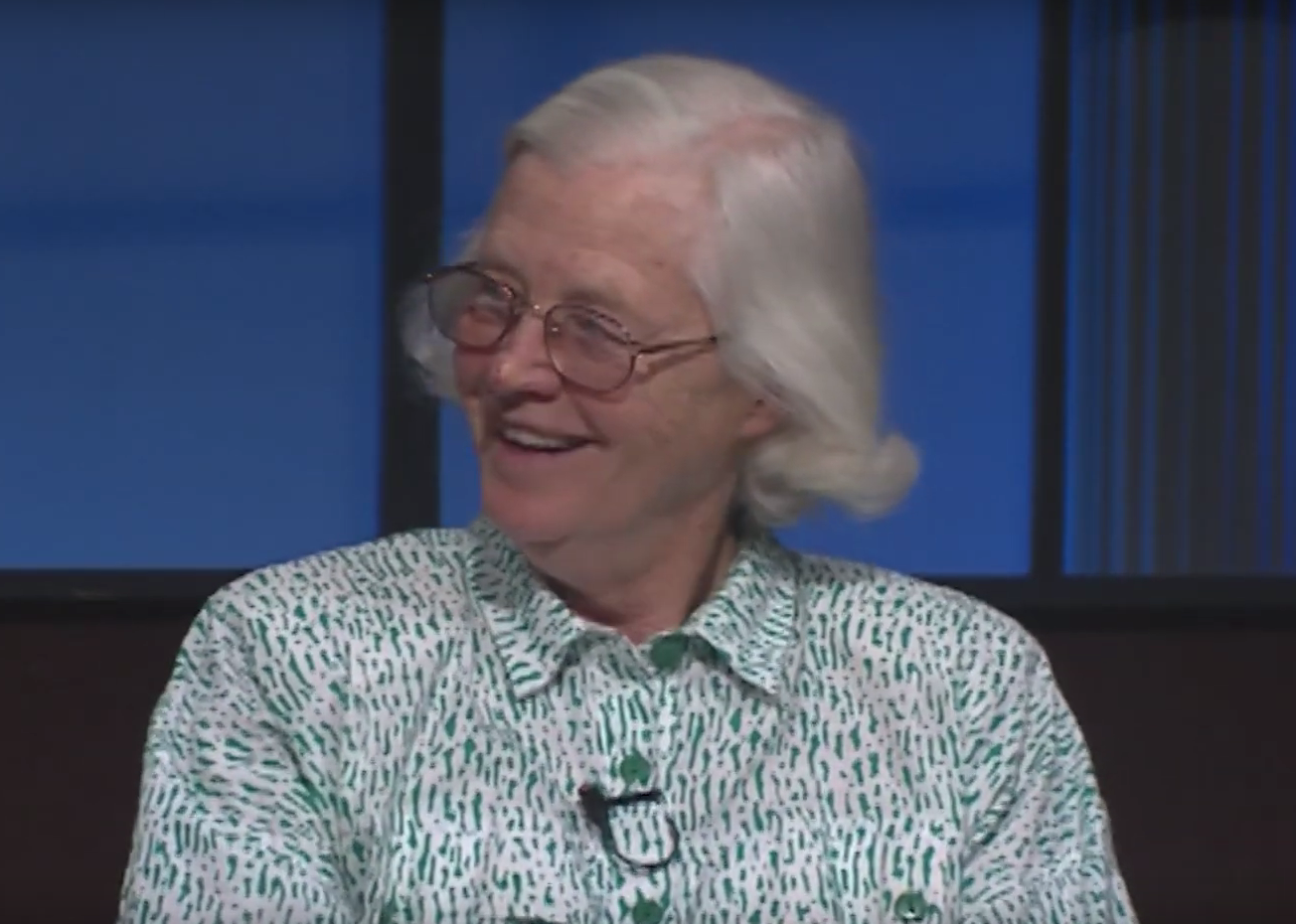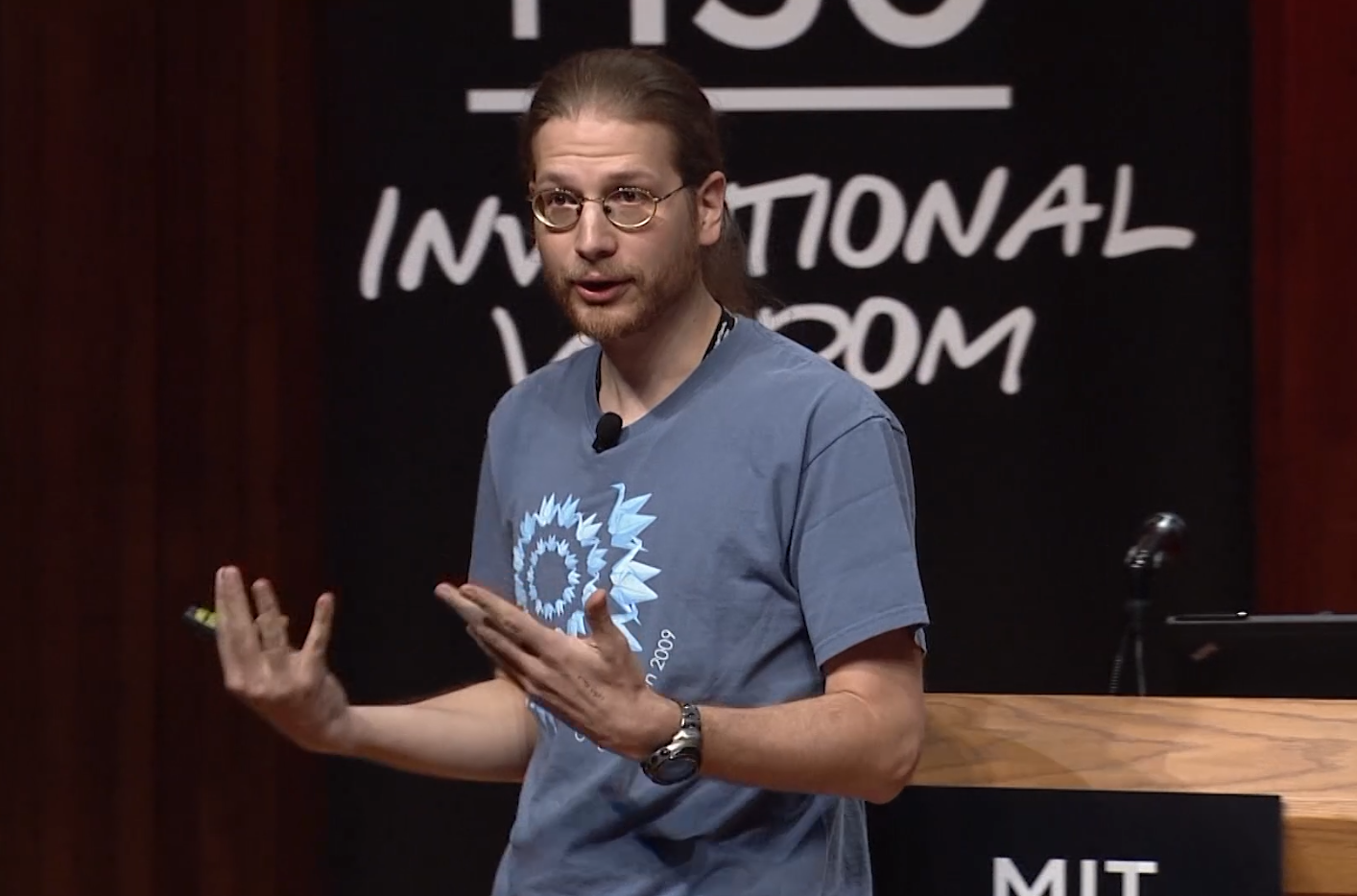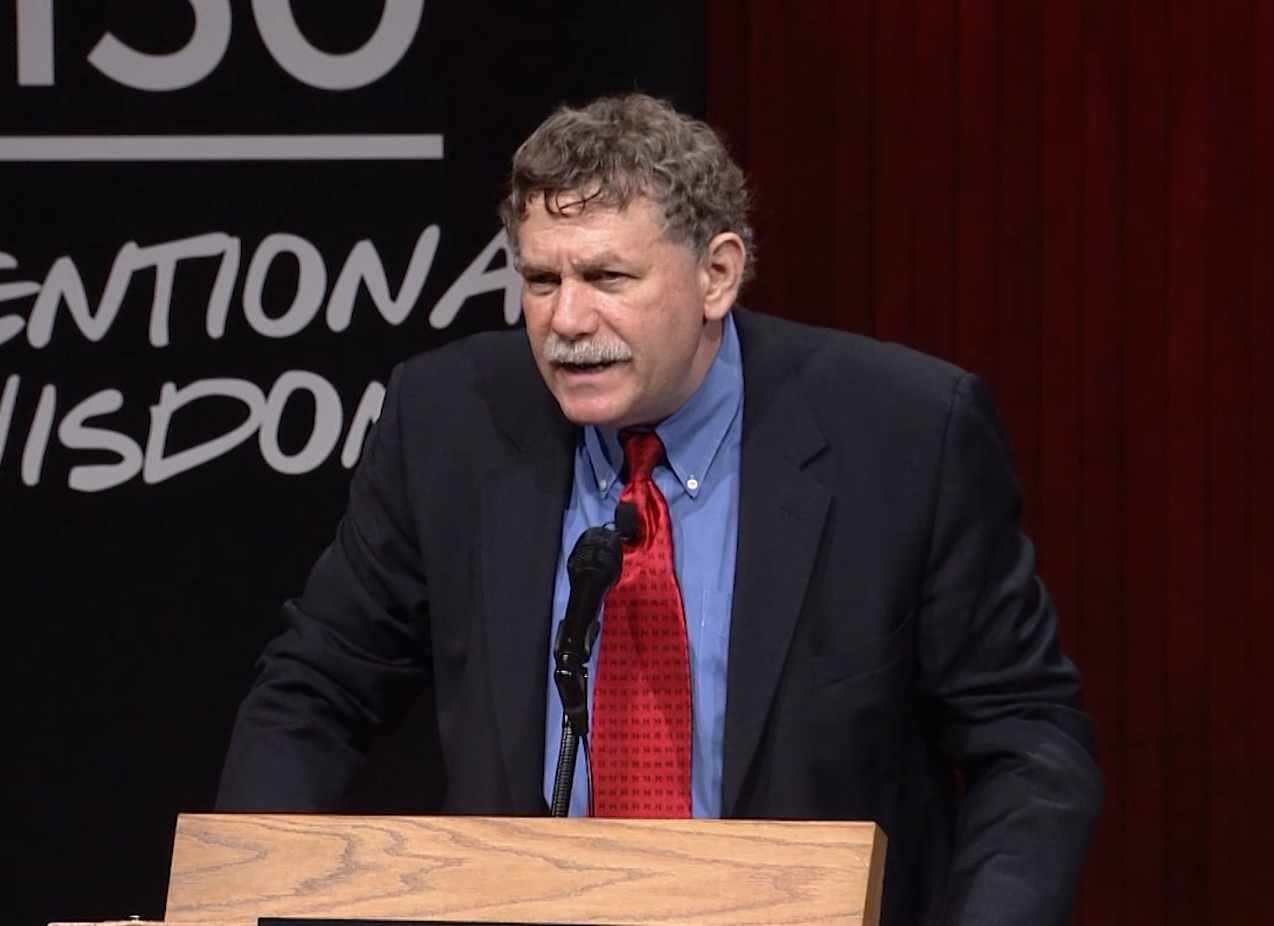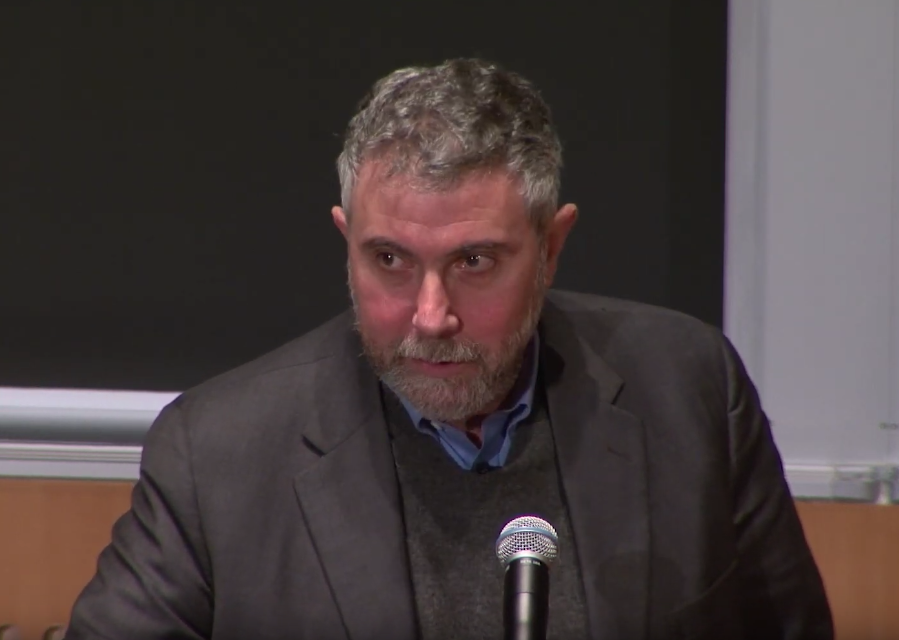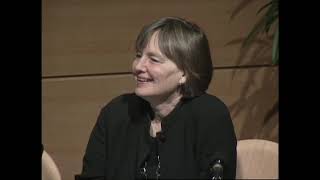Buckminster Fuller, "Spaceship Earth”
[MUSIC PLAYING]
FULLER: And having been a visitor here very many times I've had a great chance to see life changing-- the pattern, lifestyles changing very greatly-- but the environment itself changing tremendously. The year that I entered Harvard, the subway was completed and opened from Boston to Cambridge. And up to this time been really very-- well, MIT could get over of Boston quite rapidly. But MIT-- much of it had been in Boston in those days.
Because when I was young I felt the great change was taking place that had not been experienced by my father, my grandfather, all the family records that I had-- I thought it might be a good idea to keep some record of a little individual born in the Victorian period and who is coming over in some kind of new world. And so I have kept just such records. And I have really, really large archives. And they're down in Philadelphia right now.
But by virtue of having them I'm able to look at records, they're changing things, and get a sense of rates of change and have some sense of what may be unfolding for humanity on our planet. I think it great fun. I was seven when the first automobile came into Boston. I was eight when the Wright brothers' first flew. I was brought up as inherently impossible for man to fly. Those were impressionistic years up to eight years of age.
And wireless-- how crazy can you get? Even though Marconi had invented the wireless the year that I was born, we don't have an SOS till I'm 12 years of age. And so these were very extraordinary, and that was things that were suddenly becoming, and many things that I've been told would never happen were beginning to happen. I was told man and never got to the North Pole, never got to the South Pole. And when I was 14 they did get to the North Pole. When I was 16, got to the South Pole.
So there's something that was happening here that all the world had not expected that's all. That's all I'm trying to get at. So I felt really very intuitive to this necessity to keep some kind of record of the transition. I'm sure it's only because I'd did start doing that years ago that you've invited me to be here tonight. Because I have been able to keep some track and been able to make some pregnostications that have come true.
But I don't think there's ever been a moment our humans on our planet-- by humans have really come to know so much about our planet and about the local universe, where humans have ever been in such perilous we really are today. I think we're absolutely on the brink of either doing away with ourselves. And all of this then relates to-- I wonder if it'd be possible for me to have a chair brought out. I should have asked for it in advance. I have podia-phobia. I don't normally get behind these things.
[LAUGHTER]
I think I'll think better if I'm sitting down. Because I operate entirely what I call thinking out loud. Thank you very much. At the age of 32 in 1927-- which is the year that Lindbergh flew across the Atlantic-- which is suddenly a great change again, that human beings not only were now flying, but they would be able to cross great oceans. At the age of 32 then I decided to really make an experiment with the rest of my life-- trying to find out what, if anything, a little penniless, unknown individual might be able to do effectively on behalf of all humanity, the great nations and great corporations inherently could not do.
So I was just fairly simply, think about this-- luckily I'd been in the regular United States Navy and I'd had some commands. And so I could think about the fact that 3/4 of earth is water and the Navy was concerned with that 3/4 the world is water. Out of the 1/4 that is dry land, about half it is covered with ice, rocks, deserts. So then only about 1/8 of the surface of earth but propitious for life support. And that 1/8 is invited up into well over 100 nations, at the time I decided to do my experiment.
So a 100 nations dividing up 1/8-- each one of them tending to look out for its own. It was so much pioneering of humanity got it so far. She continually found herself being attacked by others. People in America had a little more luck because they were further away from the others. Anyway, quite clearly those nations were thinking about their fraction of the 1/8 of the surface of the Earth. And the great corporations were operating under the protection of the various nations. And they had to make profits at a short period of time or they go out of business. At least that's the way they thought.
So they were inherently shortsighted. And so there was nothing-- and nobody was thinking about our total planet as a ship-- a spaceship. Incredibly designed, and onboard of it all these humans. And by this time a radial accumulated knowledge, great identification of resources. So I said there's nothing to stop me as little individual thinking about then, this total Spaceship Earth. I gave it that name after a while and it became popular.
And nothing to stop me then of seeing about how to employ the total knowledge of the total resources to take care of all humanity-- paying absolutely no attention to any kind of divisions of the human beings, but trying to look at it as all humans. I wondered why the universe to have humans on board in the universe and have them on board this little particular planet. I found that the more I studied human beings in contradistinction to other organisms, the more I was convinced we had some very important function to fulfill here in the universe. And the universe had no supercargos-- that everything that was in the universe was essential to the integrity of the regeneration of universe.
So the function-- I'll come down to it very rapidly-- differentiating between humans and other organisms. I said all the other living organisms have some built in integral equipment in the organism itself that gives it special advantage in some special environment, whether kind of snout on a dog to be able to dig from the ground, or some little vine that just could grow up the Amazon-- and do it very beautifully. Or birds flying in the sky with beautiful wings, but when non-flying unable to disencumber themselves of their wings because they're integral, if walking is a difficult matter for the bird.
So I said humans then, don't have these built in special equipments. A lot of people identify brain with humans, but there are many creatures have brains. And I've found that if you want to think about it in your own direct experience-- brains are always and only coordinating the information of the senses, without which we are utterly unaware of universe. So they're coordinating the special cases. This one smells a little different than that one.
So we have packages of these special case experiences which brains are able to store and retrieve memory of. I've found humans have a special capability that are not manifest by any other creature, which I call minds. Because I heard mind and brain inter-exchanged, but I'm now differentiating clearly-- brains is physical equipment for coordinating the senses. And mind-- from time to time-- had the capability to discover relationships existing between special cases that were not manifest by any of the special cases, considered only by themselves.
As for instance, the long extraordinary case of human beings being excited by the night sky, all seemingly fixed eyes, recognizable constellations. In contradistinction to which they were one, two, three from time to time, lights that appeared a little bit brighter than the others. And you could see them moving against things, but tonight they're in different position from yesterday. So quite clearly, they were moving around-- What later on we begin to call the planets.
And these were so intriguing to humanity that they made all kinds of speculations. They kept records out of them as best they could in relation to their periods as seasons and other experiences. And they gave them names of gods. But not until human beings have calculated capability, which is really very, very recent as far as humanity in general goes-- which came along with the positioning of numbers and the ability then to multiply and divide.
If you ever tried doing your calculations in Roman numerals, you find how difficult it is. In fact, you can't get anywhere at all. So not until then these Arabic numerals came in and the cipher itself, and they got publication in northern Africa in 1200.
Then it took 300 years for it to get into Italy and southern Germany, the point where Copernicus, as a human being, has calculated capability. And with calculating capability and taking the data regarding what we knew of these planets and the sun in the sky was that we're one of those planets going around the sun. The sun was not going around us.
I want to really stress how very, very recent is that event because I find today, though it was 500 years ago, we're really not-- and everybody knows about it-- we have done very little to get ourselves actually celebrating, reacting in terms of it.
For instance, I had a great honor of being invited to speak to the MIT Faculty Club back in the early '50s. And the dean of architecture at that time was-- said to me that he found that the Architecture Department was never being asked to give any Faculty Club talks because MIT felt that it's so really MIT that the Architecture Department was sort of a department of liaison with idiots.
[LAUGHTER]
So they were not really taken very seriously. So he complained to the other deans about it. And they said, all right, you'll have the next faculty lecture. And so the dean asked me to give the talk. And because I knew about his saying about the fact that the family liaison was idiots, I said to the Faculty Club when I stood up I was very surprised to be asked to speak to them because they were all so ignorant. And they looked very surprised, and I had to make good in a hurry.
[LAUGHTER]
And I said, of any of you present who do not see the sun going down in the evening, please show your hands. There were no hands. I said you've had 500 years. You've known the sun is not going down for 500 years. What are you doing in your educational system about coordinating your senses with your information?
[LAUGHTER]
I think it's very ignorant to persist in this manner. Keep on saying you're very practical to say sunrise and sunset. Seems to be rather good poetry, but you keep continually standing your kids off with misinformation.
[LAUGHTER]
Now, that is enough of that particular episode, but I--
[LAUGHTER]
Coming back now to trying to identify humans. And I said we have this phenomena mind, and we have this matter then of planets. The idea suddenly that we're one of the planets going around the sun. And this is enormously intrigued others. And we have Tycho Brahe getting better instruments, being a man of great means, and making some better observations. He needs a mathematician, getting Kepler. And Kepler then discovering that all these different planets were a different distance from the sun, all different sizes, all going around at different rates.
So while they're all on the same team, seem to be very disorderly. But being a mathematician, he said, I know one thing in common, which is they're going around the sun, at least that. I could, as a mathematician, give them something else in common. I might be able to find radium with two knowns. So he said, I'm going to give them a known. He said, I'm going to give them so many days. As I remember, it was 21 days.
And giving them exactly 21 days, right to the second, he knew where each one was in respect to the sun or the stars. He'd know the distances from the sun. By this time, he discovered the moving in elliptical arcs. So he then had the radius from the sun or the stars and then a different radius-- a little different radius at the end of the 21 days. And he knew actually then.
He was able to make a diagram of each one of these new radius and the elliptical arc. And having these pictures now of triangles-- long, thin triangles-- he said, I have all the data. I might as well calculate these areas. Well, there doesn't seem to be any sort of triangles in the sky. Might as well do that.
And if you were Kepler and then make this calculation and discover they were not similar, but they were exactly the same, think of it-- the astonishment of a human being that hidden in this great soup of this disorder was an elegant mathematical coordination. Because obviously it was coordinated to come out exactly the same-- all of them.
So that you then have to think in a way that you and I have never have, and no other human being has ever had to think before. Because he doesn't tell you this in his diary, but supposing they were touching each other, he might understand how they might move like gears to coordinate. But they were millions of miles apart. Millions of miles apart, and human beings had no idea of anything operating in millions of miles apart in a tension and absolutely invisible-- some kind of invisible tendon operating it.
Think of it. Think of the intellectual challenge that really was. But he was familiar, as a human being, that if you swing a weight around your head, it stays in orbit. If you let go, it goes off in a line. Also he has familiar, if you wanted to make an ellipse, you have to use two restraints instead of one restraint.
So he had to assume somehow or other-- because he had found them moving elliptically-- that there was some kind of restraints of tensions operating over millions of miles. And the fact that the planets bunched from time to time may then possibly pull on-- the bunch could pull on the one, as well as the sun. And he made those kind of ordinary discoveries.
Now, here we have suddenly some interrelationship existing between that does not manifest in any one of those. Nothing-- not any one planet that said there could be strings to another planet, as you'll get out of what I'm talking about it. Because there was a group behaving this way that humanity never paid attention. And finally when a team behaving a little differently from all the rest of the universe, it finally discovers some relationship going on there.
We go on from there to Galileo measuring the rate of falling bodies, acceleration of the rate of falling, and getting the mathematics of that. And we have Isaac Newton tremendously eager to understand what this extraordinary, invisible tension was that Kepler had now discovered. And have Isaac Newton then finally being able to work out the fact that the interrelationship, the interattractiveness, was varying as a second power, mathematical distances apart, but the inverse ratio of it. That is, if you halve the distance between the two, you increase to one-, two-, four-fold. If you doubled the distance apart, it went down one quarter of it before.
Suddenly, we then have a human mind able to discover the mathematical relationship-- which, firstly was hypothetical. But then as it's tested, and tested, and tested back, astronomers are always explaining the interaction of these celestial bodies-- whatever bodies you're studying.
So this rapidly became what we call a mathematical generalization-- a scientific generalization-- and found no exceptions whatsoever. And it could only be expressed mathematically. So suddenly we find the human mind having a capability from time to time to discover a relationship existing between which can only be expressed mathematically. It's a highly intellectual matter, and we have then-- I said brain dealing in the special cases. And then the special cases were always temporal-- had beginnings and endings.
And what we have suddenly-- the human mind discovering these principles. And as I say, if they qualify as a generalized principle, it means they have no exceptions. And that which has no exceptions must be inherently eternal. Nothing to say that one of these generalizations may not someday prove to have exceptions. But as far as we know, there is a family of them today which we have no exception. Therefore, up to the time we find the exception, it must be considered as inherently eternal.
And that's very different. The human brain then asking for beginnings and endings of the universe, and the human mind having capability to discover that which is eternal.
I became very intrigued then by the idea of what we call behaviors of whole systems like the planetary systems, solar system, in which the behavior of the whole is not explained by behavior of any of the powers considered only separately. We call that synergetic.
So then I began to think about the universe in those kinds of terms and saying, how many of these generalized principles have we discovered? As we discover one, we don't know we're going to discover it, but suddenly we have it. Nor do we know whether it's going to be the last one that would ever be discovered. We don't know how many there are.
But there is an increasing inventory There's a principle of leverages, the mathematics of that. And as Galileo showed, you didn't have to have a compression lever and compression fulcrum. You could have a tension fulcrum. You could have pulleys, and falls counting out the same mathematics. So they are beautiful mathematical laws which are generalizations that human beings could use objectively as special cases.
That then gave me an odd feeling that humans had a very different kind of function in the universe. Because we didn't know any other phenomena that had access to these extraordinary generalized principles. Because when you and I use the word design, we immediately would infer an intellectual sorting and deliberate arrangement. In other words, the word design seems to involve a complex of that which is to be sorted and to be arranged.
And the best we can see, then, these human minds have been discovering these generalized principles. And I said, what is very impressive about them is not only are they being eternalized-- they're all concurrently operative-- but none of them has ever been found to contradict any of the others, and several of them are augmentative.
So in sum totally, a fine human mind apparently being admitted to some of the great design of the universe itself. I said, we must be very important if we have kind of access. Therefore, we are now trying to understand why we're bound to this planet and, we're thinking, bound to the universe itself.
I also want you to think about the extraordinary change in the phenomena concept of universe just in my day. When I was 28, Hubble discovered another galaxy. Pretty extraordinary. And we called it galaxy because we had our galactic Milky Way, our galactic system. And so there's another galaxy. And today, we know of 2 billion galaxies.
So this will give you an idea of the rate of expansion of what you and I have to consider as universe. But you spontaneously today think about the universe as vastly greater than anything I had to think about as. Universe And this will give you, again, a sense of the great, incredible acceleration of knowing that's taking place with humanity itself.
Now, thinking about that, this function of humans in the universe, I also said, one of the things that's very impressive is that human beings are all born, always born, naked, absolutely helpless for months, beautiful equipment but absolutely ignorant because no experience. So that we're deliberately born that way, even though as our eyes are designed, our brain's designed with a quadrillion atoms in coordinates, and you and I can communicate. That's all a priori.
And so it's extraordinarily dumb that we take it tremendously for granted. And it's only very recently we begin to really take some kind of cognizance so the fact that this is such incredible technology that we don't even call it technology, because it's way beyond the kind of grasp that humans so far have of technology and the kind of principles we've employed up to date.
Now-- thinking now, from this point on, I'm trying to identify why humans are in the universe and what we might be able to do about carrying on abetting what nature, our universe-- why does the universe have us here, and trying to abet the realization of that function. In view of the fact we are always born naked, helpless, and ignorant, and the relatively short time we know of our being on board here-- for about 3 million years.
It is amazing to me how human beings then being born naked, helpless, ignorant, but hungry, thirsty, curious, driven to make moves. Hungry, trying out this. And somebody eats a berry, and they die. For then 1,000 years, that tribe said nobody can eat berries. And then suddenly it discovered there's some berries you can eat, some you couldn't.
And nature didn't have any operating manual. She could perfectly well have had green safe to eat and red dangerous to eat if she wanted to. But she didn't do it that way. She deliberately forced us to learn by trial and error. That seemed to be a deliberate part of the design.
So that we've had to make an incredible number of mistakes in those 3 million years or more. And we've gotten now to a point where we have discovered so many-- 150,000 nuances of experience, which is so unique that they require their own words, and we've agreed on those words. It's amazing matter we've agreed that much, because agreements are very different.
So I found that here we have an enormous facility of communication with one another. And we suddenly have come to a point where we did get that communication. And we then began to accumulate information very, very rapidly. And I felt that all of this had to do with all of us being born in this sort of group womb of permitted ignorance, with an enormous amount of resources by which we could, by trial and error, learn something about why we're here in the universe.
And to me, then, is the most absolutely important thing about us is our minds. Clearly, our muscle is nothing. We can't compete with a donkey. And we mean to get to thinking about the energies in our universe that makes for a rather quick summary of two things.
As we know, during my lifetime and just in this century, we began to discover that chemical elements have unique frequencies when incandescent in an arc frame which could be detected by the spectroscope. And we have now, using the light coming from the 2 billion galaxies, we've been able to take that light and run it through a spectroscope. And on one of our planets, little human beings have an inventory of the relative abundance of all the chemical elements present within 11 and 1/2 billion light years around us.
The human mind can has that kind of scope and capability. But a muscle? Nothing. And yet muscle and cunning are still in control of human affairs. So this is right why we are in great peril. Because we're here quite clearly for our minds, and minds are not in control.
Now, I would come back to some things that hit me very hard and are of great significance. For instance, in the Navy, where I had been commander of a ship, and I had been so taught that I could take over the job of my senior. I could take over the ship, or I could take over the fleet if necessary. The whole training was that way, all leading up to a moment of contact and destruction.
I wondered how and why all this extraordinary technology, beautiful science had been reduced as to work to destruction. And this brought me, then, to the discovery of the fact that for up to 1500, we'd been really thinking about all the universe as a flat universe, even though there were individuals who were quite sure our world was a sphere. But that was anything but popular. The general way of thinking about it was having a flat Earth.
The Ptolemaic map, going back really 3,000 years, was fitting. It took in all of Europe, North Africa, and Asia in sort of a rectangular form. Then came to the wilderness and went on to infinity. But it was a flat world.
Now, this is true of all the great empires-- of Charlemagne, the Roman Empire, you want anyone-- Genghis Khan-- all of those empires were these flat empires going to infinity. And if you didn't like the way things are, there are an infinite number of gods and an infinite number of chances that you'd come out all right if you prayed. So it was worth praying.
And we have suddenly Magellan and discovering we're on a spherical earth. And we have the most powerful people of these times, and learned that what we call the control of the world wealth was by virtue of the controlling of the great waterways.
I'm going to-- I'd like to extend that a little, because you are MIT. And we have the archaeologically the city-state being discovered over and over again-- in great walled cities. Mycenae in Greece is a good example of it. There's a beautiful, fertile valley, great rung around the mountains. In the middle is a great high hill. And then on that high hill, you could see all the passes coming into it, and you could look at all the great fertile fields and command the whole show.
And then you have, by building great walls around the top of that hill, and then walls going down to the well, you had a very safe citadel. When you saw an enemy coming, you then took all the foods from the valley and brought them inside the walls if you could. What you couldn't bring in, you'd do what they call a scorch. You burn them up.
So when the enemy came in, all the local people had all their food inside, and they had all their water. The people who came were already hungry, and they could undergo 30 days without food without getting very, very weak. And then when they get good and weak, you can go out and decimate them. And this is why the city-state was a very successful intervention for thousands of years.
In the meantime, human beings began to build-- well, 3/4 of Earth is covered in water. Going from just dugouts and rafts, and to suddenly getting to ribbed ships. And the ribbed ships got bigger and bigger, and got to the point of about the time of Mycenae, or even Crete. And the Island of Crete, there's no fortification, because this is the headquarters of the water people. There's bigger and bigger boats.
And we have then the Myceneans going in their big boats up to Troy. And Troy, commandingly the traffic from Asia into Europe-- it was an extraordinarily important point-- complete with a walled city. So they have all their food inside. When the enemy comes, they expect the people outside to starve.
But suddenly, there were these great ships. They could go off and get more supplies, continually brings supplies up. This is what we call a line of supply. And then Troy fell. And then, from this point on, history begins that where the great and powerful people control, and the biggest control is from controlling great lines of supply.
This shows up very much when you get to Italy, where you see all those beautiful, fertile valleys with lovely castellos commanding the valleys. But there's one city in Italy that's very different-- Venice. And no walls whatsoever because they're water people. And the water people then took their ships all around Italy and brought up lines of supply, and they starved all the people out of the castellos. This was a great change over in the fundamentals of humanity.
So we have suddenly Magellan going around the world. And those who control the great lines of supply between Europe and Asia, who has enormous resources, great wealth had already been developed to bring that wealth to Europe and cash in on it. Enormous ambitions to do that.
These ambitions are operated under the names of different countries like France and Portugal, but they're really great, powerful individuals. Queen Elizabeth I founds the East India Company in 1600, about 3/4 of a century after Magellan gets around. It was a private enterprise with some of her private friends, and she was able to protect it with her empire's capability.
There's enormous battles. And by the Battle of Trafalgar in 1805, suddenly British empire is it. And it's said to be the first empire on which the sun never set. In order to carry on and develop that empire, they also developed, then, the East India Company College in England, which is still there. The campus is still operating-- very beautiful campus.
And on that campus in 1800, writing just before Trafalgar-- five years before and five years after, two different books-- you have Thomas Malthus, who is a professor of economics at the East India Company College. And he is the first individual in history to have total vital statistics from around a closed system earth, because the East India Company contacts all these servants all around the world picking up the critical information.
So suddenly, he has this incredible information, and he's able to write 1800, and then 1810 to confirm it. And quite clearly, humanity was multiplying itself at a geometrical rate, producing life support only at an arithmetical rate. And quite clearly, the majority of humanity's designed to be a failure. Pray all you want. It won't do any good. This isn't as it is anymore.
So this is very formidable piece of information for those who are in the know. But there was a general illiteracy. It was not a popular piece of knowledge at all as the information of those who were in powerful positions making very critical decisions for humanity.
We have then, 35 years later, Darwin promulgating his theory of evolution and suggesting that survival only of the fittest is the fundamental cause of it. Then we have the economists saying, all right. We like that. But Darwin said, I did not develop this in economics. I did not mean it. But the economists said, well, it fits our case perfectly.
Then we have Karl Marx in English saying he now accepts Malthus as pure science, as a closed system. It's a closed system-- hard fact. And we have Darwin, survival only of the fittest. So Karl Marx said quite clearly, the worker is fittest survive because he knows how to handle the tools to make all the products, how to grow the seeds and things. These other people are parasites.
The other people said, we're obviously not parasites. We're at the top of the heap because the workers are so dull, we need some really bright people around here. Make some kind of long distance, visionary speculations.
So we have then, since that time, a closed system Earth instead of a flat Earth. Rather, suddenly instead of being a dichotomy of different kind of religions, we have the socialist and the viewpoint and the out and out enterprise. There's various degrees between the two, but we have since that time on our planet, the great ideologies saying you may not like our system personally, but we're convinced we have the fairest, most logical, most ingenious way of coping with vessel inadequacy of life support. But because there are those who disagree diametrically on how to cope, it can only be resolved by trial of arms. Which system is fittest to survive?
And that's the reason, for instance, that Russia and the United States for the last 30 years have been appropriating over $200 billion a year-- sum total now over $6 trillion-- have been appropriating, so buying the highest capability of humanity and focus it on how to destroy most accurately, most effectively, at greater and greater distances, swifter and swifter.
This seems like an incredibly poor investment of all that we've really learned, then, right?
AUDIENCE: [LAUGHTER]
FULLER: That's where it's gone.
AUDIENCE: [APPLAUSE]
FULLER: I'm worried about time. I'm trying to think how to get everything I really need to get to in the shortest numbers of minutes.
Anyway, what I had begun to experience-- as I said, here I am in Cambridge as a little boy, and I'm suddenly having this wireless come in, suddenly the airplanes coming in. I said, I really feel something.
And what was really coming in was from what I call a visible reality. Reality, when I was young, was everything you could see, smell, touch, and hear. That's reality. And they said, if you're a sane man, and you're healthy, you knew just what you're doing. Suddenly, this is upset very much by Freud and Mesmer discovering a great many things we didn't know, but we're still doing them anyway.
AUDIENCE: [LAUGHTER]
FULLER: But when I was young, it was really exactly what I sad. You knew just what you're doing if you can smell it, touch it, see it, and hear it, can't you?
Now, I realized something was coming in which I call an invisible reality. Because suddenly, when I was three years of age, electrons were discovered. It didn't make any newspaper. Nobody knew that's going to be anything. And suddenly there were these alloys. And we're suddenly bringing, by really accident-- all the great alloy discoveries by metallurgists have been really accidental up to the time of the space program after World War II.
And so we had, them, alloys. And an alloy-- I'll just give you in terms of aluminum, which is very dramatically clear. Aluminum is where we learned to refine electrolytically only in the '90s, but we don't really use it for anything but a souvenir, as ashtrays, and things like that up to the 1930s when it goes in the airplane for first time. And the aluminum, and what we use as the obvious property giving the greatest clue to the strength of material, is the ability to go here and not be pulled apart. And so we call it a tensile strength per square inch or whatever section we want.
And so the tensile strength of pure aluminum is 18,000 pounds per square inch. We learned then, accidentally-- a little copper got into and so forth-- and it got up suddenly to double that strength of 36,000. Then during World War II, the Japanese brought in another alloy that got up to 72,000 pounds per square inch. So I could have three rods of aluminum here, one inch in diameter, say three feet long, all the way the same. No scientists can look at them, tell any difference whatsoever, and this one is double of this, and this is double again.
Now, here was something coming into World War I that I, being a regular line officer, became tremendously aware of. And up to this time, everybody knew that spies could see the size of the ships they were building. It took a long time to build a ship. You could take, then, the total cubage of the weight of that water, that cubage of water was all the ship could weigh, everything had on board.
But suddenly, I saw in World War I that a ship is coming at you and has the same tonnage as your ship, has the same number of guns, the same size guns. But yet, this you don't know, and it's coming at you, that its metal is much stronger in the front, and it can fire much further away. And this became the most highly classified secret information in World War I, was the alloys.
And suddenly we had an invisible reality. And the public couldn't tell about it. It's very easy to keep a secret in complete ignorancy and no way to understand. So one ship went to the bottom, of they couldn't tell anything about it. And so it is very easy keeping that kind of secret.
AUDIENCE: [LAUGHTER]
FULLER: So I became fascinated, then, in World War I to realize that we're beginning to do more with the same and more with less. And I could see it was coming in many different ways. In electronics-- Malthaus didn't know. He assumed if you had a message to go across the Atlantic, you had to send a ship. It was going to take 40, 50 days. He didn't know I had a little piece of apparatus. that I could do it at 186,000 miles a second.
I said, how many things did Malthaus leave out? So I began to keep lists of it. By 1917, really late 1917, I'd become really excited to realize there was something going on in humanity which had me intuitively curious anyway, where we're doing more with less invisibly. And might be someday that you do so much with so little, it might be possible that Malthaus was wrong. It might be enough for everybody if we did it enough of it.
This was a terribly challenging idea as a kid to really get in to see it could be true. I came out of the Navy and went into the building world. I stayed in that building world for five years, and I found it thousands of years behind the arts of the environment controlling of the sea and the sky.
I just wanted to point out, too, how you talk about how much-- you know exactly what a Boeing 747 weighs, loaded-- three tons-- and her rate of climb, how many people she can carry. You know everything she can do out of every pound of material you put in, every ounce of materials, every erg of energy, every second of time. But you ask if you people what buildings weigh, they don't know what the buildings weigh.
If you don't know what buildings weigh, you certainly don't have any way to ratio performance or just want to get an idea of the building world on the land being thousands of years behind that of the sea and the sky. We know exactly what you're getting out of every ounce. You have to know.
So I became excited to realize that it was in the building world that we're really behind, because there was something called priorities in relation to the military. If these heads of state, then, are going to have to protect themselves against other states, they're going to defend themselves. There's not enough to go around. They've been told that. Then they leave things to the military to defend them.
The military will say, well, all right. We now know that there are these chemical elements. And there's so much mercury, and there's so much helium. And they do something absolutely unique that nothing else could do. Who has access to these absolutely unique, high performance materials? Who has access to the unique, very high performance of special instruments and tools, production tools made by well-trained brains?
Obviously, then, you have priority of access to the high performance capabilities. The military had that. This meant then that if you have priority, you have to have anti-priority. Who has to make do with the low performance or no performance at all? It was obviously the home front. There's not enough for people anyway. Let the poor devils get on the best they can.
So human beings being human beings and trying to make the best of life, did get up in architecture that was, to them, at least attractive out of the make do. Where we have then the bigger heavier, the thicker the wall, more secure. That idea went out in architecture along with the Maginot Line.
AUDIENCE: [LAUGHTER]
FULLER: And right up to then, you consoled yourself that way. The bigger, and heavier, and higher the walls, the more secure. We used to have all the advertisement when I was young about a great insurance company with, Safe as the Rock of Gibraltar. They don't use that advertisement anymore. No.
AUDIENCE: [LAUGHTER]
FULLER: Now, what excited me in 1927-- I'd been in this building world and found that no scientists ever had even been asked to look at the plumbing. Just think of it. No scientist has ever done anything about the plumbing. You have beautiful courses here on frictions in pipes and things like that, but nobody is redesigning the plumbing.
Here we have the human beings, every one of you, several times a day taking this beautiful sun evaporation, water getting in the sky and coming down and absolutely pure to us. And we take that beautiful water, and we use four and five gallons several times a day to get rid of a pint of yellow.
AUDIENCE: [LAUGHTER]
FULLER: How much sense does that make?
And they'd just say, the home front was absolutely thousands of years behind the art of the sea and the sky.
So in 1927, the American Institute of Architects, as they do today, had their journal. And in their journal, they published buildings they thought well of. And they had a single family dwelling in Illinois in 1927 which they thought was optimum for under the conditions of 1927.
I took that total floor area, total cubage, total number of windows and lumens of light that could get in, everything it had equipment to do, listed all the performance capabilities. And I took its total weight, including the pipes out to the mains. It came out 150 tons.
Then having to match the same cubage, same floor area, every performance capability of the single family dwelling, Illinois, but using the most advanced aircraft design of the time, it came out only three tons. So I said, three tons against 150.
If we really began, instead of waiting, which was going on in those days. I saw after the military developed something, then suddenly it became obsolete. They had to take the weapon, and people who were all tooled up to produce this kind of equipment, then look around the home front for some outlets. This is how the process of the refrigeration which it had in the navy for 25 years suddenly came up on the land in the '20s, and suddenly you didn't have to have ice in your box there.
And so I saw there's fallout that came very secondarily, very laggardly, maybe a quarter of a century, maybe half a century later, came into the home front and began to change the standard of living. In the terms of which, yes, in my day, we've gone from less than 1% of humanity to 56% of humanity enjoying a higher standard of living today than was known or expected by any potentate when I was born. And during that time, we've doubled the population-- so actually have 112-folded the number being benefited by advanced technology. But all this was a very slow feedback from the preoccupation with how to kill.
So I said, supposing we didn't wait for that, but looked at the home front right away. I was indicated by this three tons against 150 that maybe we could really get doing so much with so little, we could really demonstrate to humanity there really is enough to go around.
So that was 52 years ago, and I have engaged in that direction ever since. Then and now that brought me across into geodesic structures, where I could do very much more with very much less. There are now over 200,000 of them somewhere around the world. They're in remote places where the very highest kind of performance is required, where other kinds of structures just would not do, whether they're ringing in the DEW line with radios or the experimental station over the South Pole, or whether radar on top of Mount Fuji able to withstand the most extraordinary hurricanes and gales, snow loads. So delicate that microwaves can go through, yet so light that one helicopter took it up there and fastened it in place like a great bird landing.
So I've had enough experience in the logistics of environment controlling. And due to the factor also, I've been counting on, since 1927, what I call the World Game. Instead of the navy game of World War games where the people in the land were not concerned, but the Navy was concerned because 3/4 of this is water. And then who's going to get control of the line of supply? That's the whole the story.
And how many resources are there around the world? Whole training of the navy was to learn those things. And now I said, I'm going to play a game called World Game not World War Game, where I look at the sum total and see how I can use it, if possible, to make all humanity a success. It seemed to be indicated as implicit in this trending of doing more with less.
Now, so I've kept all kinds of curves. I kept the curves of the rate of increase of the tensile strengths in the steals, and then got into the aluminum. I found that I could predict the aluminum curve would follow it. And it did, et cetera, et cetera. And by keeping enough track of all the total data, I've been able then to be able to say certain things back.
10 years ago, I was able then, by actually, design, able to say it is now incontrovertibly evidencable in engineering that we within 10 years have a design revolution where using only proven technology, using only metals already mined that are recirculating, it's perfectly feasible within 10 years to have all humanity living at a higher standard of living than any humans have ever known before-- on a sustainable basis.
Because during that same 10 years, we can phase out forever all further use of fossil fuels and atomic energy. We can live entirely on our energy income.
Now, this became, as I say, incontrovertibly demonstrable. For instance, just take the energy side. We have a book which is published by our World Game, Energy, Earth, and Everyone. You'll be able to get copies of it from Doubleday in July.
The first printings were exhausted, and the title went from the Straight Arrow Press in San Francisco to Simon and Schuster, who sold it to Doubleday. And Doubleday has been very slow on bringing it out, but it will be out in July. You'll find absolute incontrovertible ability to live on our energy income.
And incidentally, I'd just like to mention the following to you as a world of technology. In World War II, the grand strategy against Hitler was then to cut off his energy. And they were able to then bomb Ploesti and so forth immediately. The German scientists went to work, and they learned how to keep their economy going on their energy income entirely from the vegetation.
They were able then, to, go into the four kinds of alcohol to Grand Central Station of energy. And from there, they could get-- you may have remembered they also developed the very high performance rubber, where instead of having the 10,000 mile tires, got up to 50,000. And they did this all on alcohol.
All coming entirely from vegetation, they were able then to produce high octane gas, gasoline. They were able to produce food. And they kept their economy going.
It's very amazing to me that the United States rushing in as they did in Berlin-- and because I was in the broader economic world, and I know we had all that data. None of this data had been brought out and the energy mentioned to you. I want you realize that there's-- why didn't that come out?
Well, the next thing I've discovered, having made a statement such as I have just made to you, I'd been able to make it 10 years ago and have been making it publicly ever since. You get checked up at such statements. And possibly over a thousand really quite confident people have checked over my data found it's correct. It may be about a million people who have credited those 1,000. But there are 4 billion human beings, so humanity doesn't know this. But there is an increasing number who know that it's possible.
Now, the next thing I discovered was that all big government-- which is political-- all big politics, all big religion, all big business found it absolutely devastating an activity to have humanity a success. They're all predicated on humanity being in trouble.
AUDIENCE: [APPLAUSE]
FULLER: Come to me. Join our side. We can get you a little better deals.
AUDIENCE: [LAUGHTER]
FULLER: You're poor people. Come here. I'll comfort you and get you into Heaven, you know? All the different things. Everything predicated on man being in great pain, trouble.
So then I realized that rather big individuals who might be very excited by anything you as the little individual might do in way of finding a better way of sun energy impounding-- because it all comes from the sun. They pay lip service to you, but big government's going to do nothing about it.
So I mean to say, what are our odds here? Here we come to new knowledge, first time in history, we don't have to be a failure. If we don't have to be a failure, it doesn't have to be you or me ever again. It doesn't have to be any war. You don't have to rationalize selfishness. You don't have to rationalize why your family is a little more deserving than the other fellow's family. It's why you should cheat the other guy.
Just think if we get in that kind of relationship to the universe.
Anyway, I said that does not seem to me to be unreasonable. But it does follow that hydrogen atom doesn't have to earn a living when it's not behaving like a hydrogen atom. In fact, the only function that's come in the universe, that had to do this you or me-ing, as far as I know, is human beings. There's all the rest of the universe working very extraordinarily, eternally regenerative. The only 100% efficient system we know of.
Now, this then brought me to observing everything else I could, and evolution is going on. I'll give a very big evolutionary event.
Historically, humans, like other mammals, the female carrying the young, can't cover as much geography annually as can the male. The North American wolf averages a very much greater sweep out-- the male does than the female. And so we have these in humans. The human female then learned to get a fire going, and she could then keep the food lasting a little longer. She learned how to dry it. She stayed around the hearth preserving and consolidating the gains. The man was a hunter, and he'd bring in a new kind of creature. She would decide whether to skin it or milk it.
AUDIENCE: [LAUGHTER]
FULLER: And so gradually, the man not only was the hunter, but he also was a newsbringer. Because he got to the top of the mountain, and other people hadn't been there. So to all the children through history, mom and dad were the authority on what you can to eat-- what their was that dad and mom and found that you could eat, what the chieftain would put up with, and so forth. Dad and mom were the authority for this new little life here.
Not only that, but dad in addition was the newsman. And dad's language is very inadequate and very poor over the great ages, but anyway. What he'd seen from the top of the mountain, or he'd heard that the chieftain said-- and his language was very poor. But the kids, then-- dad is the authority, and this is the way dad says it. So the esoteric way of communication went to the kids all right, but it started more and more dialects and different languages.
Suddenly, we have-- I said the electron coming in when I'm three. The year I was 23, we had the human voice on the radio. The year I was 27, we had the first licensed broadcasting radio station.
In 1927, all the daddies were coming home one evening, and all the kids said, Daddy come in and listen to the radio. A man's flying across the Atlantic. And Daddy never brought the news home ever again. It stopped. Nobody thought about this anthropologically. The news was it, and you're preoccupied with the news.
But the fact was, then, the people who got the job on the radio got it by virtue of the commonality of their diction rather than special esoteric way that Daddy said it. And they updated by virtue of the size of vocabulary and they were skilled in employing it. That's where they got their jobs and then maintained them. And there's liquidity in which they could get it out.
So the kids then saw dad and mom listening to that radio. And they saw dad run across the street telling what the radio man said. So quite clearly, dad and mom were the authority, but these were more of authority, because dad and mom are learning from them. So the kids then emulated the words the way the great authority said it.
This completely changed the speech pattern of humanity. One of the things I've lived through was that change.
I'll show you. Here in Boston, my first job before World War I, I worked with some very expert craftsman, very fine human beings. They're very lovable. But their vocabulary was about 100 words, 50% blasphemous and obscene.
AUDIENCE: [LAUGHTER]
FULLER: Mainly the way they spit to let you know how they feel about it.
But this has really changed. It's incredible to me. I now have been around the world 44 times, and the vocabulary around the world is just extraordinary. I can really use the very best I have in me, and I find myself being understood very readily. Now, this all changed in our lifetime, and it came about by virtue of that radio and getting some commonality of diction at some point.
Now, the next thing that happens is, nobody said to the kids, this is a great authority. It simply is self-evident that this is the great authority. Now, the kids instinctively follow the great authority. The child wants to know.
So then, as you know, the speed of sound approximately 700 miles an hour. The speed of light, approximately 700 million miles an hour. Approximately a million times faster. And sound only operates in our atmosphere, and the light goes right on. The amount of information you get visually in ratio to what you get through your ears is a million-fold.
So suddenly we have the young students at Berkeley out in California making the world news as dissenters about the educational system. That particular group asked me to come and meet with them, and I met their contemporaries at many universes out here. They graduated, and the majority of them graduated in '66.
Suddenly, I found those kids were born the year the television came in the American home. And they all said, I know that dad and mom love me to pieces. I love dad and mom to pieces. But they don't know what's going on, have the slightest idea what was going on. They don't have anything to do with our going to Korea or going to the moon. They don't have to do with anything. They're just lovable human beings, but the world is in trouble.
And this information we're getting from around the world now, not just locally anymore. Well, I guess, I had very local information when I was young. They're really getting world news. The world's in trouble. The older people don't know what's going on. I've got to do my own thinking.
Now, I'll show you one of the things that was very different about this. When I was young-- my father died when I was very young. And my mother said, I'm going to send you to the best school I can afford to do. I don't have very much money. We're going to want you-- and she said, darling, never mind what you think. Listen. We're trying to teach you. I went to school, and they said, never mind what you think. This is what we're trying to teach you. We're intended to only no never mind what you think.
I was also being told by men as I got older that life was very tough. It had to be you or me, so you've got to get over all your sensitivity. Get over your sensitivity and never mind what you think. So I found myself out of the gate with it all So it was sort of a game that you had to learn. And so I learned the game as best I could.
But nobody's saying to the young world anymore, never mind what you think. There's just none of it. We suddenly have a young world-- that's just going back then to the '60s-- where suddenly a young world started doing his own thinking. He's very knew at that, very idealistic.
With Russia and the United States spending $200 million a year on how to destroy. They appropriate about $20 billion a year or 10% of it on how to break down the other man's economy before you get to the war. And that's it. So the United States had free press that was very much easier to operate against than the Russian side where they didn't have free press. I heard the Russians say-- they said to me many times, I can't understand why you keep a free press, because we can get a bonfire going in America, it goes all over the place.
At any rate, we have then there was no question about the young people who were very idealistic being exploited very ingeniously. And so there were all kinds of activism then in the '60s. But then suddenly the kids found they were using their heads for battering rams. They said, I should use my head for thinking, not for a battering ram. And so they began to develop an immunization to the being exploitable. So today, they're nowhere nearly. Each year, I'm finding a very great difference.
I have been a visitor now at 550 university college around the world. Many of the colleges many times-- like MIT, in almost innumerable times. I really have quite a good feeling for you to tell you that there is a very great strength in that young world today doing its own thinking, and realizing it isn't an invisible world. And you're going to have then have competence to carry on in the invisible world, the invisible reality. Which is what you have here at MIT of all places.
So the next thing I saw was each child being born successively was being born in the presence of less misinformation. And each new child being born successfully being born in the presence of much more reliable information.
Now, I saw that-- I'm getting letters today, not so frequently, but I get them, say, four or five a year from 8- and 10-year-olds who've been born after man got to the moon. And how they find that I'm someone they can write to, I don't know, but they do. Their letters are beautifully written. And they say, humanity can do anything it needs to do. Why don't we make this thing work? They're completely full of concern about it. And I say, nature is coming through with something new here in the way of capability.
And so I have you also being born naked, helpless, ignorant, having to learn by trial and error. Humanity then gained the point where it did develop words, did gain a whole lot of information, but made an incredible number of misinterpretation about--
[AUDIO OUT]
--you take a polished steel ball 16 inches in diameter, it would probably be rougher than our Earth's planet. Pictures taken of our planet coming in from outer space, we can see through the cloud cover. You can see the blue water, the brown land, but you can't see mountains let alone human beings. You and I standing on top of one another's head making a chain, it'd take 10,000 of us to make a difference between the outermost and innermost points of our Earth. So you and I are 1/10,000 invisible.
Now, our planet Earth's diameter is about 1/100 that of the sun. If you look at the sun in the afternoon when there's cloud in front of his white does disc, take coins out of your pocket at arm's length to try to cover it. A nickel just about covers it.
You'll find that the size of our Earth against that-- our school rulers remember, 1/16 of an inch. What, engineering scales get down 1/50, 1/100 of an inch. But beyond there, everything gets blurred. You have the very finest printing where seeing absolute continuity of red and the colors, you have 1/200 of an inch.
Anyway, our planet Earth is so small against the sun as you and I couldn't see it, you couldn't see it. So you and I are invisible on our planet, and our planet's invisible against the sun, which is rather an inferior star. We have 100 billion stars in our galaxy. And let's look at Orion's belt at two bright stars. One one of them, Betelgeuse, its diameter is greater than the orbit of the Earth around the sun.
So there's a good sized star, all right. But understand we have a very small size where there are 100 billion stars in our galaxy. We now know of 2 billion such galaxies. Obviously, that kind of universe is not interested in whether the Republicans or Democrats are being elected.
AUDIENCE: [LAUGHTER]
[APPLAUSE]
FULLER: Nor is it interested in our baseball news or anything else.
AUDIENCE: [LAUGHTER]
[APPLAUSE]
FULLER: We on our planet here, Earth, are talking practically insanity in relation to our universe.
So I saw that nature, then, did this cut off where she had all of us in this group womb, and with all the resources by trial and error to get enough information to get a point where we make some completely new judgments-- the kind of information I, luckily, happened to be just functioning-- did come to it. We now know there's enough to go around. It's clearly demonstrable. At which point we really have to have a completely new generation.
So I see when nature has a child in the womb, then the child has to have oxygen. But the mother is out where the oxygen is, and so she does the breathing, gets it in the bloodstream and the umbilical cord to get to the child. When the child comes out it, you cut the umbilical because it's now got its own.
I think nature, then had what I call a metaphysical cord. She had where the older people telling the younger ones what they've been able to find out to accumulate and to get some words, to get a working start. But we got to the point where there are so many misinterpretations of the significance have been made that the time came for a cut off. So she suddenly has this young world cut-off.
I said, I don't want to do that. To me, it's an enormous, enormous evolutionary event, incredibly big evolutionary event, that a young world is suddenly doing the thinking. As I said, I brought up here-- never. All the older world assuming the thinking capabilities of the young are absolutely unreliable.
So here we are in this new chapter. And I can see that maybe that new young that's coming through will really take over.
And things are becoming less and less tenable. Now we've found quite a long time ago-- the great religions realized they could not stay operating just within 150 pens-- nations-- so they became transnational. And we found all big business found that. They've all gone transnation, taking all the money out of America, incidentally.
So the Americans have 4 billion people in 150 pens subject to drafting, and any of the big powers can use it, just throw you up against their enemy whether you like it or not. But we're under a condition now where, fortunately, we've discovered this scrap recirculation. We don't have to do any mining. And that's scrap recirculation. We have 150 pens. We really have 150 blood clots.
For the economics to really work for the recirculating, regenerative universe, which we're finding ourselves in. Suddenly, yesterday looking out just this way, we now discover ecology over here, that the whole system is regenerative. So we're part of an enormous regenerative system-- the universe itself. But things are going off like that rather than in front of us.
I just feel that there's a great, great possibility that this younger world will very quickly reject something. I'm going to run some slides for you now because I want to get a little sense of acceleration and some other big evolutionary events.
May I have side number one?
This slide number one. Does anybody know what that picture is?
AUDIENCE: [LAUGHTER]
FULLER: I took it from a high school wall in New York City. On it, Greenland is bigger than South America.
AUDIENCE: [LAUGHTER]
FULLER: North-- America we're very big. We're bigger than Africa. The United States is enormous, much bigger than Europe and everything else. So it's very flattering.
But this part of Russia over here seems to be 25,000 miles, that far, Russia only a mile apart. So there's no Antarctica. That we could show this to kids at school to come and keep selling such junk as this, that seems to be incredible to me.
I said years ago, I want to really think about total inventory of our resources. I need a background against which there's no visible distortion. I'd like to be able to take the data of a sphere and project it out on the flat. And I discover a way of doing it. I'd like to tell you rather quickly how it is completely unlike any of the methods of projections that have been used.
As we find mathematically, you can divide-- you can get three triangles around a corner in a spherical tetrahedron. You can get four equilateral triangles around an octohedron's corner. You can get five icosahedron around a corner. You can't get six because you have 60, 60, and you have 360 degrees. It'd be a plane going to infinity, so in order to come back in the south, the limited number of equilateral triangles around a corner can only be five.
I took this spherical icosahedron with its 20 equilateral triangles-- each of the corners are 72 degrees. And I found a method then. If you think about a steel band-- three steel bands that have inch marks on them, if I bend one of them, the inch marks remain still an inch apart. If I then take three such bands, and I am going to take each of those bands and weld. Each one would be 12 inches long, the band. And I've got a 12-inch long rod going through each one at its point, perpendicularly through it, welding it into place-- a very stiff carbon rod. And so it's 6 inches above, 6 inches below.
If I take those ends of those rods and pull them together with one steel band, the whole band will just bend. But the 1 inch points on the band don't change. They hold a uniform scale whether flat or in the band condition.
If I take three such steel rulers with three sets of rods going through them as I spoke about it, and I put a little bolt at the ends to make it into triangles, it looks like a triangular fence. Now I'm going to take all the bottom of all those rods and pull them together. It makes each of the bands bend, but it makes two of the bands bend away from the third band. It opens up the angle of the corner, makes sure it goes spherical triangle. So it gets up to 72 degrees and has to be, then, spherical.
So with the icosahedron, I have 20 spherical triangles. Each of those corners is 72 degrees. When I take them off, holding my uniform boundary scale so we don't let any infinity in the system at all, then the corner angles go from 72 to 60, which is called 12 degrees spherical excess. But because it's done absolute symmetrically in equal angle triangles, then there's shrinkage of the data inside the triangle but not along the edge. The edge old absolutely true.
There's a very mild shrinkage internally, and it's mostly the center. And the shrinkage is so minor, there's no visual distortion between the relative shape and size of any of the parts on the sphere or on the flaps.
Now, I'm going to show you a map which will not look familiar to you at all. Next picture, please.
This is made out of my triangles, which are such that-- I wonder if I could get somebody to help me a little more. Claude? I think that there is a light pointer, is there not?
[INAUDIBLE]? Good. I think I can get up here quite well.
There are on this map, incidentally, 100 white dots. Each one is 1% of humanity located very accurately for the center of that many people. On this picture, let's look at-- here is, then, Greenland. There's Greenland. And you can see then it's 1/3 the size of Australia. And now we have the Antarctic showing.
Now, I gave you, then, the dots are the human beings-- 1% each. And here's the Equator going through South America. Only three dots south of it. Here's where the Equator goes through Africa. You have only two dots south of it. I have it going where it goes, through Java, Sumatra.
Sum totally, 10 white dots are south of the Equator, but get very close to the Equator. 90% of humanity lives north of the Equator, and the small 10% that's a little below it.
Thank you, sir, very much.
Now here, there's where the Equator goes through Africa. Here's where the Equator's going through here. And s Java and Sumatra here.
Mainly, then we the people living in the southern half, and humanity knows very, very little of this great southern hemisphere. We just came to the Antarctic when I was 16 years of age.
We have then-- I spoke to you about the British. This is a water ocean world. And this is the way things were when I was young, and it took-- all those people who wrote to one another, it took them six months to reach each other.
My father was in the-- here we are in Boston in the leather importing for the great shoe business here. He imported from Buenos Aires and Calcutta. It took him exactly two months to go to South America each way-- two months each way-- and it took him exactly three months to get to Calcutta-- and three months each way.
So humanity was really divided. This is what typically he called the East, and this is what he called the West. And he said east is east, and west is west. Never the twain shall meet because he did not live in an airplane world. He was thinking in a water world.
And here we have then that 54% of humanity, 29%, and here, the Americas is only 12% altogether.
Now, in that water world, you could not change your cargoes at sea. The two ships would chew each other up. So harbors were of the greatest importance for that great international trade. And so that's coming to America-- to Boston. We had St. Lawrence, which would freeze up in the winter. Boston Harbor many times got pretty badly iced up. And there's nothing to compare with New York Harbor with deep water and an enormous amount of deep waterfront, well-protected inside of the Long Island and Staten Island.
Then we have-- on the West Coast, we had San Francisco, Seattle. There are relatively few good harbors in the world. And North America, then, would be able to build a railroad between the East and West of the San Francisco and the New York, and so forth.
Now in 1961, three jet airplanes which nobody knew were going to be coming, three jet transport airplanes outperformed the Queen Mary, Queen Elizabeth-- the steamship of the United States. In the year 1961, ships of the sea became obsolete. Again, a big, big evolutionary event for how humanity goes from here to there. From here on, we're getting there by air, which was utterly undreamed of in my mother's time.
So we have, then-- here's that great water ocean world. And the British, who were running it, then found if you got down to the Southern Pacific here, you'd get on the roaring force of how the what goes around west to east. The water went faster than the crystalline Earth, and the winds even faster still. So we had what I call a Roaring Forties going around here.
There's no such thing in the Arctic. But in the Antarctic, there is. And you can see where the great ice floes chewed through what we call the Great Horn.
So the British discovered all you had to do was come south in the Pacific, get in the Roaring Forties, you're going right to the Atlantic. Come the south Atlantic, ride on the Roaring Forties-- in the Indian Ocean. Indian Ocean-- right in the Pacific again.
What do the British got? They got the southern tip of South America, Africa, South Africa, Australia, New Zealand. They got on the merry-go-round. The people all the way out here, no idea. So this is a picture you're seeing first time the British Empire, which they were not eager for anybody to see. Anywhere, there it is.
And now 1961, those airplanes they arrived sad.
Next picture, please. Number two.
So suddenly we have here what I called a sky-ocean world. It's the first time in your life or any-- if you haven't seen this map before, it's the first time humanity is able to see all of the surface of our Earth without any visible distortion of the relative shape or size of any of the parts and without any break in the continental contours. We have one world island and one world ocean.
It took me two years to find out how to get all those sinuses in the water. But at any rate, there it is.
So suddenly this is the new intimacy-- this way. This is the way we're going to be going.
And we're still-- I was just reading this day's paper about New York getting in a new convention center for $350 million. There's so much property in New York and San Francisco that they'd do anything to have conventions somehow, to keep it going. But absolutely dead-- obsolete, utterly obsolete.
We have then, when I was young, 90% of Americans were on farms-- today, only 7%. And all the people that started for a moment hanging fire are using those cities. There are dormitories, the sort of big university areas, but they're obsolete as anything to do with the way they were conceived originally.
And now on this map, you'll find humanity. And I find that it is-- 95% of humanity can reach each other on the shortest great circle air routes without going near the Atlantic, Pacific, or Indian Ocean.
So this is a north-south world. And I found something else very fascinating. It's coming in with the-- you may remember that the delivery of electricity, delivery of energy from here there, there's no way we get so much so fast as by wire. And the limit of the practical deliverability from World War I on up to recently was only 350 miles when you go across the time zones. But since the space program came in and got what it called ultra high voltage, we have Americans now deliver 1,500 miles.
I made a world network of electrical energy networks not only then showing how we then go across our time zones. And anyway, those times zones would reach very nicely from here to Alaska. And in Alaska, we can reach right across. The Russians have been building hydraulic electric stations along all their northern-flowing rivers in here. 1,500 miles, you can reach across to the Russian network. And that means you can get into the China network and all the rest of the world.
Now, when Trudeau was about to make his first trip to Russia-- we are friends, and I showed him my electrical energy network grid. And he was very excited by it. So he took it. He gave it to Breshinev, and Breshinev had his technical people check in. They said it looked very, very practical to them.
I can simply say to you with all the nonsense going on in our world-- money world today-- we've completely separated money from wealth. Wealth being the ability to take care of human life.
We have, as I just gave you a little while ago, the ability to take care of everybody at the highest standard as others. We have 4 billion billionaires on the planet right now, by the way. The game of money being played keeps everything very scarce again. So the money game is going to go out completely. We're going to be a mess.
And what will happen is we'll all get onto the-- what it the accounting system of the universe? It's energy. And energy and time. Energy and time-- and nothing else. And so we're going to get on energy time.
So the minute we get on the same grid, it's going to be very, very easy to really have the vaccinating or whatever we need to do. Way of accounting can be done this way absolutely beautifully. So I want to give you a few little quick insights.
Now, that is all I'm going to show you in the way of pictures. All I wanted to do was-- may we have the lights on? I mainly just wanted to give you a sense of very swift-- oh, no. One-- whoa, whoa stop. One more, one more, one more, one more. All right.
Sharpen it up best you can.
Now, people you won't to be able to read this chart, so I'll just simply tell you what it's all about.
It is a chart that is 800 years long. And-- am I in your way too much here?
This chart-- I wanted to have, as I call it, a way of charting gains of science against time. Within science, of course, we have then, as you say, pure science. And then within pure science, we have the isolating of the chemical elements. And the isolating the chemical elements happens to be a closed system affair where membership is absolute and right by the number. And that's all the numbers have to be filled. We have one electron, one photon, et cetera, et cetera. Nobody can cheat, at any rate.
We have, when history opens, humanity had already discovered and was using the-- we have carbon lead, tin, mercury, silver, copper, sulfur, gold, and iron. On this chart, I go up one step every time we've isolated a chemical element. So it starts nine steps high. It's 1200 AD is the first known isolation of a chemical element by a human being-- arsenic. That's where my chart starts.
We go 200 years, then we come to antimony. 200 years more, then phosphorus. Then 75 years, and it suddenly starts climbing very rapidly.
You see an accelerating time and a slow down time-- accelerating, a slow down. The accelerations are always peacetime. These slowdowns are always wartime.
Now, we get to a point where-- and I'll get the pointer again.
And suddenly this very much was flattening out here. This is 1932, so the depth of the Depression, but also the year in which we made the 91st isolation of chemical element only 90 out of 92-- 91 only present on the planet, so we could isolate.
Any rate, we have here the, the shelves have fallen for the first time in history. We've taken the physical universe apart into its own unique chemical elements to be reassociated into preferable ways. From there on, we get into post-uranium, and then suddenly it's going like this.
Now, very interesting, they come in here. They don't come in by the number of chemical number. 37 might be the seventeenth isolation, and so forth. But from here on, they're coming in exactly by the numbers, which is a very extraordinary thing.
Any rate, against this background of pure science, we have, then, applied science, obviously. And what does humanity try to do with this type of capability? It tries to clothe-- it starts naked, yes? And then it gets some skins on it, so it gets ready to get in the cold. Then you put a double skin in a tent, and get ready for colder still.
Against this background of science, I give humanity the requirement to develop an environment control device. Which you can get into, and from inside of it, control the energies operating outside to take him in one complete circuit of our planet. But we're going to have an absolutely standard performance requirement against his background.
Here he goes around in a wooden sailing ship for the first time. 350 years later, he goes around in a steel steamship. 75 years later, goes around in an aluminum airplane. 35 years later, he goes around in an exotic metal rocket.
At the time when this wooden sailing ship, nobody could dream of the possibility of a steel steamship. At the of the steel steamship, nobody could dream of an aluminum airplane, let alone we hadn't learned to fly yet. Time of the airplane, nobody could dream of an exotic metal rocket.
So yes, having some enormous acceleration going on here. You have this basic acceleration of science against time. We have a contraction of 350 years, 75 years, 35 years. This one took two years to go around. This one took two months to go around. This took two weeks to go around. This one took a little over one hour.
You're witnessing quite visibly three-- third power acceleration. It's implicit on this chart.
If we go to 1985, right in here, I'm going to have to send you around in a way inconceivable in the time of the exotic-- I'm going to have to send you around by radio.
AUDIENCE: [LAUGHTER]
FULLER: This chart is the most powerful thing I've ever had to get me to really feel-- want you to feel-- the acceleration that we're in. Because all of the things that you have been very familiar with, like the nations are going to go, and you see, in this case, the United States going into bankruptcy, going into-- all these great power really going downhill very rapidly. You're going to have all kinds of things coming apart that you've been very familiar with. And in its place, you're going to be coming at some of the things I've been talking to you about.
I've taken lot of your time. Let me see what we are at in the way of the clock.
That is the end of slides. You can put on the lights again now.
It is now 9:30. I've been exactly the hour and a half that we're supposed to. Now we're supposed to get into questions.
You have a choice of asking me questions or letting me ask myself the questions I've been asking myself for a very long time and answering them in some kind of order for you.
AUDIENCE: [LAUGHTER]
[APPLAUSE]
FULLER: I have a telephone, and I keep getting telephone calls at 3 and 4 o'clock in the morning. And people say, I'm calling you long distance, and that seemed to justify the strange hour.
AUDIENCE: [LAUGHTER]
FULLER: I say, do I know you? And they say, no. And I say, I've got a very important question to ask you.
I said, all right. I assume then you must think I have an answer. That's why you're calling. I do have an answer because 52 years ago, I made up my mind. I'm not going to ask anybody else any question. I'm going to find out for myself. So if you really want me to help you, I suggest you hang up.
And I listen. I listen, and granted, I say, a few of them do hang up. But they start their talking, and then I know they're just lonely, call up to show off.
AUDIENCE: [LAUGHTER]
FULLER: So I hang up.
AUDIENCE: [LAUGHTER]
[APPLAUSE]
FULLER: Anyway, I would like to give you a little bit of what I think of some of the things that-- you're going to not only see all the great nations going and going. They'll have to go with 10 years.
I feel that to-- to have a very-- I'm going to carry through a little more on the function of humans in universe, which I spoke about as having a mind capability.
I said, what can I find that's common to all lives in all history right up to this minute, second? That is, common to all lives are problem, problems, problems. That all of us here are for problem solving. And if we're any good at problem solving, you get much more difficult problems to solve. It don't come to utopia at all. It was exactly the opposite direction.
That we're quite here for problem solving, and we've been given access to some of the great design of universe to help us solve the problems. I say, let's you and I look at a great design like a Boeing 747, go up inside of all these instruments. And all those instruments are connected with different parts of your ship, and the power plant, and the airframe.
Every bit of critical information regarding that ship is coming to you. And this is inherently just to people who don't get into technology to think about what's really going on here. In designing a single family residence, 500 drawings is the most you have to have. You may use 1,000 of this type of nail, but 500 will do. And the tolerance-- 1/16 of an inch is fine.
Get into the automobile which is moving around in different parts at different rates. We have to really look out for that. We get to 5,000 types of parts in an automobile and tolerances of 1/10,000 of an inch. We're getting that Boeing 747, we're up to about 50,000 types of parts with tolerances sometimes 1/1,000,000 of an inch.
There's more engineering goes in one rivet in a Boeing 747 than a whole single family dwelling or even the automobile.
And then that beautiful thing in the sky, it has to be able to take 650 miles an hour, which is 10 times the velocity of a hurricane. And the resistance increases second power of the speed so that the ferocity of the interaction of the Boeing 747 with atmosphere is 100 times the ferocity of a hurricane. There's no way for our imagination to really-- and there's that thing going around the silver thing going like that.
You take 350 tons and land it at 150 miles an hour. The music going is quite a piece of design.
AUDIENCE: [LAUGHTER]
FULLER: When they say, better fasten your seat belts, it's bumpy today, the stress involved with that ship is the equivalent to taking Queen Mary over Niagara Falls and saying its' bumpy today.
AUDIENCE: [LAUGHTER]
FULLER: It's an incredible piece of design. And humanity knows so little of this. The ignorance of humanity because of what I've said of the invisibility of the reality is, as I said-- today, there are 40 million engineers and scientists on our planet, but that's only 1% of humanity. And the 99% don't understand science because they don't understand the language of science. And the 99% who don't understand the language of science, and words being quite new to them, think of the word technology as something new. They don't know that all the science we've ever found is the universe's most incredible technology.
So the 99% think of technology as something new-- as weaponry and machinery to compete for their jobs. And they think they're against it. So here we have humanity as only out to really make it is by a design revolution, using technology to really make humanity a success, to be proud of the great success of the universe itself.
So that's really a very tough one. And that relates primarily to the fact that the mathematics is a blockage-- where it's indigestible to leave many.
I'd like to get that point out of the way in a hurry. I became convinced when I was very young the nature was coordinating in a way that was not best expressed by the mathematics I was being taught. I've been taught, for instance, about pi-- that you couldn't design a circle or sphere without using pi. And I was taught, as I stayed in mathematics, that pi was what is called transcendental irrational. It could never be resolved.
So I said, every time nature makes a bubble, how many times does she carry out pi before she discovers it can't be resolved? What time does nature decide to make a fake bubble? I don't think nature is using pi. I don't think nature has a departments of physics, and mathematics, and biology, and has to have department head meeting to know what to do when a leaf falls in the water. She has only one department, and I'm eager to find it if I can.
And I found nature never saying, what shall I do?
I don't have to make-- nature knew I wouldn't know what to do. And nature knew exactly what to do.
AUDIENCE: [LAUGHTER]
FULLER: So I said, I'd like to find nature's coordinate system. And I don't think it's going to be x, y, z, flat, perpendicular. world because that was when we thought of the flat Earth. So that would have been very convenient if it was true. And I said, I made myself a tubular necklace of four tubes, and I found it didn't hold its shape. So I don't think she's using a square either, because it there's no such thing that won't hold its shape.
I think nature-- if I want to get anywhere near what she's doing, I'm going to have to deal in her in the terms of right from the beginning with all the energy qualities. It has to have heat. It has to have longevity. It has to have weight.
And I saw the centimeter, grams, seconds systems tried very hard to get it. But they never could get the temperature in.
So I said, well, I'm going to deal in vectors. I like vectors, and I learned about those at the Naval Academy. I'd been taught about a straight line by my teacher at school. She said, there's a straight line. I said it didn't look very straight to me. But she said it was. And she said it went to infinity. And I said, where's the other gone?
AUDIENCE: [LAUGHTER]
FULLER: And she couldn't tell me.
So I didn't like the kinds of things being taught at school at all. And I finally then got into pursuing nature's own coordinates. And I'll point out to you that nature does not operate perpendicularly parallel. Nature is convergent And divergent. She is radiation, divergent, gravitation, convergent-- everything that experience says has to do with waves going omnidirectionally.
So I've discovered nature's own coordinate system. It turns out to be a nominally triangulating world where the minimum smallest system in universe is a tetrahedron. The minimum-- the only polygon that is self-stabilizing is a triangle. And that is-- the tetrahedron is the smallest, simplest structural system in the universe so far.
We've gone into this. And you can read my book, Synergetics, at any rate. And another book-- volume two-- will be coming out in September of this year. And it's very much more voluminous. And we're absolutely confident now we really have found nature's coordinate system-- entirely rational. It's entirely conceptual, and any little child could really understand it.
And enough about that. But I think it's going to be possible, then, through the video so the great 99% of humanity who don't understand science and technology can become extremely appreciative of it really almost overnight. And that will make it possible, then, to get them oriented towards exercising the option to make it with a design revolution.
Now coming back to humans in universe and their functioning, and then the fact that they have access to great design of universe-- or some of it. And they have then also problems, problems, problems. Coming back to that great big Boeing 747-- superbly designed, all those instruments up there, giving me all the critical conditions on board the ship, both the power plant and the airframe-- I'd say then next to each one of those instruments is liable to be another dial which would be bringing on automated response to the typical set of conditions that I'm obtaining. And if those didn't work, then the pilot himself and the engineers could take over on the controls.
At any rate, I'd say in order to have an eternally regenerative universe-- which is what we call a scenario universe and not an instant universe-- in order to have a totally regenerative universe which is 100% efficient, you'd have to have some local information gathering and some local problem solving in the terms of fundamentals of design of that universe itself.
And I say, humans have been given that capability. Quite clearly, we've been able to go out and get that information 11 and 1/2 billion light years around us. That we are here for local information gathering, local problem solving in respect to maintaining the integrity of an eternally regenerative universe.
Now, nature then, when she has an important function to fulfill, does not have, as they say, all the eggs in one basket. She-- for instance, in order to have humans on the universe to do this, we're going to have to use an enormous amount of energy. We can't get enough through our skin from the sun to carry on, so we have all the vegetation impounding the sun radiation for us.
And then we have that vegetation then having to be rooted so that it can get water, it can withstand enormous winds and also take care of its hydraulic pressure requirements and get water back in the sky. Because the vegetation rooted, it can't go out and plant its seeds in preferred places. So in nature, then, it needs this very much to keep the human being going on our planet, and she then has each tree launching little flying machines-- little seeds-- by the many, many thousands. A few of them may land where they will be prospering. Many of them will not.
So when she has a very important function and very poor chance of survival actually being realized, she makes many starts. As I say, she would not have-- the function we have to perform would not be just in this one little team on board our little planet Earth. The same function would be planted many places in the universe.
In this particularly one, I say we've now come through the being designed deliberately naked, helpless, ignorant. We're getting to the point where we discover these beautiful principles, that our minds are everything, that muscle is nothing. We're in final examination now as to whether we're really going to qualify. And if we'd really qualify, mind must take over, and we must get out of the way of ever having to earn a living. That really can't go on with our real function of solving local problems of the universe and getting more and more information.
So I think I'll-- our examination from my acceleration curve to say we only have about 10 years to make it. In fact, I'm down to about eight years now. So it may be shorter still. We don't know. The acceleration is enormous. That's the main thing.
And so then you say, what can I do about it? The way things are set up now, all this political system, and I don't have anything to do with the political decisions. Everything really depends on you personally. I wish I had a blackboard here, but I'm going to have to do something with you mentally, because we all have very good imaginations.
I'm going to give you a triangle. And I'm going to bisect the edge of that triangle in to connect. I've The edge reads two-- edge module is two. There's one, two, three, four triangles. Make a triangle, now the edge module is going to be three. One, two, three four, five, six, seven, eight, nine.
Make an edge module of four. One, two, three, four, five, six, seven, eight, nine, 10, 11, 12, 13, 14, 15, 16. So 16 is two to the second power, and 9 is three to the second power and so forth. You could say triangling instead of squaring.
And you find that only a triangle is the only polygon that holds its shape. And you discover a square is two triangles. Nature is always most economical.
When nature multiplies herself down to the cell, which she does time and again, which is nature doing? Triangling or squaring?
I just gave you experimental evidence. Squares don't even hold their shape. Which is nature using? If anybody goes out of this room saying squaring, humanity's all through.
AUDIENCE: [LAUGHTER]
FULLER: It's a question from now on about your personal integrity in daring to really go along with experimental evidence. And really speak about it, and do something about it. If you do, then the whole thing's going to work, because we do have all the evidence that we now have the capability to make it. So it's going to really depend on your personal integrity.
I can give you the same thing showing that-- I'll make a little cube out of necklace of tubes. It falls down. I put triangles together, it makes the octohedron. Holds its shape. All triangles do.
And when we use a cube for unity, as we do in centimeters, grams, seconds, a cube of water, et cetera, et cetera, et cetera, we find that the only reason it holds the shape it does is because you have six square faces, don't you, on a cube? If I put a diagonal across each face, it makes the six edges of a tetrahedron. There's a tetrahedron holding it there.
And it has to do that it has four, one, eight octahedron superimposed on the triangle face of the tetrahedron. When the tetrahedron is unity, then the octohedron has a volume of four, and the cube is exactly a volume of three.
And I could go on then to show you that we can then-- with the tetrahedon and octohedron filling space-- that we can call all this the third power. I can show you quite clearly the module is one. It comes out as one tetrahedron. If the edge module is two, it's eight tetrahedrons. If the edge module is-- remember, tetrahedron do not fill all the space faced by himself. They have to be completed by the octohedron at a volume of four.
So I can simply show you that the edge module reads three, the volume is 27. If the edge module reads four, the volume is 64 of the tetrahedron. In terms of-- so I can say tetrahedroning instead of cubing. And if I'm using cubing, I'm using up three times as much universe is available. And that's exactly why the mathematics of science is so absolutely ridiculous. You had to get an imaginary number and everything to accommodate going out of this universe.
Usually tetrahedrons say right in the universe is all conceptual, right from beginning to end. Don't have to have any nonsense about there are no models. When does nature suddenly check in the models? So we say it's models all the way. And all of it is completely intertransformable.
But any rate, I go into it in Synergetics. So I say again, if anybody goes out of this room saying cubing when you see third power, again, we're all through, because you need three times as much universe as is available. Fairly simple.
Now, so you-- I want to really get out what I feel is what you personally can do is going to be really depending on are you willing to really have everybody accommodated? Are you willing to have everybody really get there? Or are you got the sort of ego that doesn't want that to happen, et cetera, et cetera? Are you really going to go along with the experimental evidence?
But whether we make it or not, then, is not a matter of how our leaders behave. It's how the humanity itself behaves. It's not a matter of a few being surviving. It's a matter of humanity. And humanity's going to go by virtue of fact you've all now got a vocabulary. You've all got an enormous amount of information. And then just how much guts have you really got to go along with information?
The information is that all the old systems are obsolete. Not because they weren't good yesterday at all. They were absolutely essential, like the umbilical cord was essential at the time it came out of the womb. But we're coming out.
I'm not saying the flag wasn't great yesterday to what humanity's gone through. Incredible courage, and love, and dedication, humanity gets where it is. No faults at all with yesterday, but we're out of that womb. We're supposed to be coming out now, and birth is the most dangerous time of all. We're in birth.
So I am very deeply-- it's something I haven't said anything about tonight at all.
In 1927, I made up my mind to make myself an experimental experiment to see how well the little individual could really do and do everything with artifacts, not trying to reform human beings, but by participating in the environment itself. Because I saw you and I are 60% water, and we're hydraulically designed-- hydraulic compression, et cetera. That water freezes and boils, and all the rest, so we'd have to be in the biosphere. And any other information gaining phenomena operating on Mars will not look the way we do on this particular planet here in the biosphere.
So I came to thinking about many, many things-- certainly about life, and integrity, and mind. And I came to the working conclusion-- I was just overwhelmed by the a priori intellectual integrity of our universe-- that there were those generalized principles to be discovered, and that they really were a great design. And that it could only be intellectually expressed mathematically.
So I said, I'm overwhelmed with a great integrity. And I'm assuming then that I have been born at a moment when somebody's supposed to be poking their neck through. The information is here. And I became really very much an outsider because-- I just want you to understand I did not make good at the game of making money and so forth. I lost all of my friends' money. I was not only unknown generally, but pretty much a disgrace to the few who did know me.
And I said, I'm really pretty much a throwaway. And I'd like to see what would happen if we really made assumptions about all the things that I'm giving to you. That it was implicit that we could do someday so much with so little to take care of everybody.
It was also, it seemed to me, that I saw that human beings having this great hunger and so forth, gradually learning how to domesticate a milk cow, then learn how to take the hide of the cow and make shoes. And the shoe man making more shoes than he could wear. And the shoe man wants a milk cow, and the milk cow man cow wants a pair of shoes.
They realize they can't cut the cow up and still milk it. So then the man who grew the milk cow, it took him much more time to grow the milk cow than it took a man to make shoes. So this is when they invented money to make up for that.
So I saw that nature, then, in order to have human life going on on our planet would need a great deal of energy. And I spoke about having to have the vegetation to impound the sun radiation for us. And incidentally, to be completely anti-entropic as to take the random seeds and convert them back to beautiful, orderly, molecular structures. And which other creatures could employ to grow more and more orderly types of species so that the Earth was a very anti-entropic affair.
At any rate, with the vegetation then doing this impounding and being rooted, it couldn't reach the other vegetation to procreate. So nature then invented all the mobile creatures, whether worms or butterflies, to go back and forth between all the vegetation to cross-pollinate them. But nature didn't say to the honey bee, I want you to go out and cross-pollinate all this vegetation. What nature did was give the bee a chromosomic instruction to go after honey. It was continually after honey, and inadvertently did knock off the pollen.
So I saw nature was accomplishing all these things at 90 degrees. You get drive like that. So then she had all the human beings-- honey money drive-- going after money. And they've got a stinger. And if anybody tried to take my money, I'd sting them.
So I said, what she's really doing is at 90 degrees. So I said, supposing then I make the working assumption that what-- I've given them to you-- is that we have a function. In fact, I've committed myself to try to abet that by developing environment controls that would help to make them able to function more effectively. It could be that if I was doing what nature wanted, I'd get on. It would be very mysterious.
So I made a working assumption. It was enormous. I said, I have to have absolute faith in the integrity of universe. And that if I'm doing what nature wants, I'll find myself getting on. That is 52 years ago, and I have gone on all this time. And I've had to say, only the impossible has happened continually, day after day.
And I have been able to get on. I have been able to get the artifacts out that I required. Really, actually many millions of dollars, actually-- but I never know. I have nothing to the budget, really only up to the absolute last second. And then if I don't get one, I realize I'm on the wrong track. Because nobody backed my paper but my own. So I had to then say, let's try this tack. That wasn't the tack. And what else, what next needs to be done?
I've made an incredible number of mistakes, but I've been able to get here.
But I think it's worth your while knowing that I do represent also an experiment in seeing if you can get on if you really try to do what nature wants to get done rather than how do you look after yourself.
Now, that the end. I'm overwhelmed by my faith in this way. I tell you that like all human beings, I couldn't be weaker. I've made many mistakes. At times, I lose my faith, and everything goes wrong. And every time it gets really dead, if you yield absolutely, then everything just works out superbly.
Now-- so I say I know we have the option to make it. I think our time is very short. I think if we're going to make it, it's going to be by the virtue of youth and truth. But really the most extraordinary thing about that young world, as all worlds, is that feeling you had of being loved. And there's so many feeling how we're suddenly loving.
So that young world knows that stones don't love stones. So there's something incredible in the world of love. So I find that young world, nobody's saying to them, get over your sensitivity anymore. They're really are guarding their sensitivity. So they have much more integrity of daring to really go along with what they see and what love tells them.
So say if we do make it on a planet-- I know we have the option-- it's going to be by virtue of the fact that the youth loves truth. And the youth abhors hypocrisy. So with the love of truth of youth, we may make it. Thank you.
AUDIENCE: [APPLAUSE]
FULLER: I'd have been very disappointed if you didn't do that, and I stood up hoping you would.
AUDIENCE: [LAUGHING]
FULLER: I'm-- for the last five years, I'm averaging an audience of 1,500 every four days. And if you didn't stand up, you'd be the first audience that didn't.
AUDIENCE: [LAUGHTER]
FULLER: Now what I feel is very important for you is the following. I spoke about 90 degrees and said it like this. It's a free session.
And if you're in the room with me and like what I said, you say, I liked what you said. It reads pretty well in my experience. It seems very reasonable. But when you're doing what you just did, you're saying, I'm going to tell the people beside me here that I like what you said. So you're talking to each other and not to me.
And that's very important. Because if we get into very critical issues ahead here, we are very liable to have-- I want you to remember about when Germany lost all its money in World War I. They got into a dictatorship, at which point nobody is allowed to know what the other one thinks. You're told what to think.
And we're very liable-- if we're going to come in great many emergencies, there are liable to be a lot of guns out. There are going to be lot of very sad things may happen.
But I want you all to remember. I'm able to tell you. Around the world, I've been speaking with people. People all over respond as you did just then.
It's very important for me be able to tell you that apparently I'm speaking pretty much the way humanity around the world would feel it's reasonable to carry on. Thank you.
AUDIENCE: [APPLAUSE]
